- Home
- Carolyn Keene
The Haunted Carousel Page 7
The Haunted Carousel Read online
Page 7
Minutes later, they had said good-bye to Carson Drew and Hannah Gruen, and were driving off to the marina in Nancy’s little blue sports car.
The evening had turned sultry rather unexpectedly, and by the time they reached the houseboat, the moon had disappeared behind a bank of clouds.
“Gee, I hope it doesn’t rain,” Bess said plaintively.
“What’s the difference? It’ll just be more cozy.” George laughed.
“Right,” Nancy agreed. “Don’t worry, Bess— we’ll be safely docked at the marina.”
Once aboard the houseboat, the girls changed into their nightclothes and made cocoa. Taking their cups out of the galley and going out on the
small, open deck, the girls settled themselves in deck chairs and listened to the water gently lapping against the sides. At George’s suggestion, they began telling each other ghost stories.
As a wispy fog drifted in from the river, the stories grew spookier and spookier. Finally, Bess called a halt. “If we don’t stop right now, I won’t be able to sleep for bad dreams! Let’s go to bed.”
Giggling, her friends agreed. Going back inside the cabin, they settled down in their bunk beds and, one by one, dropped off to sleep.
Sometime during the night, Nancy awoke . . . with an unpleasant sense of danger. What had awakened her?
With a sudden gasp of alarm, she realized that the houseboat was in motion! She could feel the deck swaying to and fro beneath her—far more than would have been the case if the boat were still safe in its sheltered slip at the marina.
It must have come loose from its moorings, Nancy realized. We must be adrift on the river!
Springing up from her bunk, she pulled on her robe and slippers and hurried out on deck. She shivered as the damp night air sent a chill through her body.
Thick layers of swirling mist surrounded the houseboat on all sides, and it was impossible to
see more than a few yards in any direction. Yet despite the fog and darkness, there was no longer any doubt in Nancy’s mind that the boat had come adrift.
If they were still in their berth, a faint, haloed glow should have been visible from the marina’s dock lights. As it was, not even a glimmer pierced the dark, oily fog anywhere she looked!
The distant hoot of a foghorn and the muffled clang of a ship’s bell reached her ears through the billowing mist. The eerie sounds racked Nancy with a thrill of apprehension.
Oh, what can we do?! she asked herself. The first thing, of course, was to wake Bess and George. Then they’d better start the engine and try to—
Nancy broke off with a sudden cry of fear and her eyes widened in fright.
The high, white bow of a good-sized motor cruiser had just loomed through the fog only a short distance away! The craft was bearing straight down on them!
13. Telltale Prints
For a moment, Nancy stood paralyzed with fear. Then she roused herself to action and began shouting, “Stop! . . . Stop!” at the top of her lungs.
She had no idea where to find the switch for the houseboat’s running lights, but darting back inside, she at least turned on the cabin lights and also snatched up her handbag.
George and Bess had already been awakened by Nancy’s loud cries. Bewildered, but realizing that some sort of emergency had arisen, they both jumped out of bed, wriggled into their robes, and followed her out on deck. The sight of the oncoming cruiser shocked them wide awake!
Nancy plucked a small flashlight from her bag and began shining its beam back and forth. The other two girls joined in her frantic shouts.
Just in the nick of time, the high, white prow of the cruiser veered away!
Presently, an angry male voice came bellowing through an electric bullhorn at the three trembling girls. “What are you doing on the river without lights?!”
As the other craft maneuvered into position alongside the houseboat, Nancy was able to explain that they had been securely moored at the River Heights marina, but that somehow the boat had come adrift during the night.
The cruiser skipper, by now sympathetic and concerned over the girls’ plight, offered to tow them back to the marina if they would throw him their towline.
George hurried forward to haul it from the water under the cruiser’s powerful searchlight. Nancy saw her gasp and frown when the end of the rope was in her hand.
“What’s wrong, George?”
“See for yourself, Nancy!”
The end of the rope had been cleanly and freshly cut!
“We didn’t just come adrift,” George went on, putting their mutual thought into words. “Some-
one cut us loose from our mooring!”
Bess was nervous and shaken by this discovery, but Nancy tried to allay her fears. “Never mind, we can worry about that later,” she soothed. “The most important thing right now is to get back to the marina!”
George tossed the line to the waiting cruiser captain, and he promptly took them in tow. Within an hour, the girls were back safe and sound in their slip at the marina. After thanking their rescuer emotionally, they lost no time in crawling back into their bunks, and all three were soon sinking into an exhausted slumber.
Next morning, the girls slept late. Then, after a light breakfast, Nancy dropped Bess and George at their homes and drove on to her own house.
“Nancy, your dad called about an hour ago,” Hannah Gruen greeted her. “He’s going to be in court the rest of the day, so he asked me to tell you that he’s talked to Mr. Trimble, and you’re to call him when you get in.”
As she spoke, the housekeeper took Nancy’s overnight bag and handed her a slip of paper bearing the lawyer’s phone number.
“Okay, Hannah. Thanks.” Nancy went to the front hall telephone and dialed the number. When Hannah returned a few moments later,
she was just hanging up. “Well, I’m off to lunch with Mr. Trimble,” the teenager reported. “It’s the only time he can see me, so I’ll just have time to change!”
Ten crowded minutes later, she was on her way to La Cuiller d’Argent, the restaurant where she had arranged to meet the attorney.
As she entered, Nancy was greeted by a dark-eyed headwaiter with a waxed mustache. “Mam’zelle Drew? M’sieu Trimble is waiting for you. Come this way, please.”
He showed her to a table occupied by an elderly man with a mane of white hair.
“So you’re Carson Drew’s daughter!” The lawyer stood up with a smile and shook hands with the young sleuth.
“I’m very grateful to you for seeing me on such short notice.” Nancy dimpled.
“Not at all, my dear. I don’t often have a chance to lunch with a lovely young lady.” After they had ordered, Mr. Trimble said, “Now, how can I help you, Miss Drew?”
“I understand you were Mr. John Trent’s lawyer. Could you tell me about him?” Nancy asked.
“Well, there’s not much to tell, really. John Trent was a self-made man. He started from scratch, opened up his own small machine
shop, and built it into a major machine-tool company. And made a fortune while doing so, I might add.”
“Do you know much about his background or his past?”
“Not a great deal. I gathered from various remarks he made over the years that he came from a poor background—and he certainly adored his only child, Joy. A lovely girl, by the way.”
Fred Trimble paused to offer Nancy a roll, then went on, “He never spoke about his wife, you see. Apparently, her death must have been a bitter blow. I do know that during most of the time I served as his personal attorney, he employed babysitters and housekeepers to care for Joy. And then, recently, his widowed sister, Selma Yawley, came to live with them to help out.”
He fell silent while the white-coated waiter served their eggs Benedict. Once they were eating, Nancy said, “Joy mentioned something about her Aunt Selma being only her temporary guardian.”
“Hmph.” The lawyer cleared his throat, looking slightly uncomfortable. “Yes, well, my client wa
s concerned that Joy might not be too happy under her aunt’s guardianship. So he specified privately in his will that, under certain circumstances, other arrangements might be worked out.”
“You mean, a different guardian might be appointed?”
“Ahem!” Once again Mr. Trimble looked uncomfortable. “I’m sorry, Miss Drew, but I’m not at liberty to discuss that subject. Joy is now seventeen. I can only tell you that when she reaches the age of twenty-one, she will come into her father’s fortune. Until then, it will remain in trust under the control of myself, as the executor of his estate, and her guardian, who at present is Mrs. Yawley.”
As she enjoyed her eggs Benedict, Nancy sat thinking of Mr. Trimble’s phrase, “under certain circumstances.” The question was, what circumstances?
Only one thing seemed clear, Nancy reflected. John Trent must have sensed instinctively that his sister, Selma Yawley, was not the ideal guardian for his beloved daughter, Joy!
The young detective and the elderly attorney finished their delicious meal while chatting pleasantly about various subjects.
“Thank you for a lovely lunch, Mr. Trimble,” Nancy said as they parted.
“The pleasure was all mine, Miss Drew, I assure you!”
Nancy decided to call Joy Trent to arrange
another visit that afternoon. But on her way to the Trent house, she stopped off at police headquarters to speak to Chief McGinnis.
“Nancy! I was just going to phone you!” the chief declared as she walked into his office. “I just had a report from our fingerprint lab about that stolen boat.”
“They found the prints of the boat thieves?” iVaricy ijxrerr'ec? hopefully.
“That’s right. And believe it or not, they belong to Fingers Malone and Baldy Krebs! Our boys matched them up with a complete set of prints Detective Norris brought us from the St. Louis Police Department.”
“Oh, wow!” Nancy was excited. This news strongly suggested that Fingers and Baldy were the two dark figures whom she and Ned had seen on the carousel Monday night, and that they had made their getaway by stealing the boat, as she had already guessed.
But why were they so interested in the carousel?
After pondering for several moments, Nancy said, “Chief, is Detective Norris still in River Heights?”
“Yes, he’s still keeping watch for those two crooks at Riverside Park.”
“Is there any way I could reach him?”
“Sure, no problem.” McGinnis promptly had a radio call sent out to the park policeman, Officer Doyle, asking him to have Detective Norris phone police headquarters.
Within a few minutes, the telephone rang on Chief McGinnis’s desk. Detective Norris was on the line. After acknowledging the call, McGinnis handed the phone to Nancy.
“Nancy Drew here,” she said. “I’d like to ask you a question, Detective Norris. You told me Fingers Malone was almost caught at the park in St. Louis, but got away when Baldy Krebs wounded the arresting officer. Did that by any chance happen at an amusement park, or was it just an ordinary public park?”
“No, an amusement park, Miss Drew.”
With a growing feeling of excitement, Nancy continued, “Did either of them have any previous connection with amusement parks? I mean, for example, is that where Fingers has usually operated as a pickpocket?”
“Funny you should ask,” Norris replied. “As a matter of fact, Fingers Malone was caught in that same amusement park just before he was sent to prison. You remember I told you he’d served twenty years of a twenty-five year sentence just before he broke out and became a fugitive? Well, it was really on account of that
amusement park that he got sent up in the first place. I’ll tell you how it happened.”
Norris explained that, at the time, Fingers was being hunted for his part in a serious gangland crime, quite different from his usual specialty of picking pockets. But he had gone into hiding and could not be found.
“Then one night a prominent St. Louis businessman, a jeweler, got his pockets picked while he was at the park with his family. He was sore as the dickens and raised the roof down at headquarters. As a result, the chief of the bunco squad assigned an extra detail of detectives to patrol the park. And on the second night there, one of them spotted Fingers with his hand in a lady’s purse and nabbed him right in the act!”
Detective Norris chuckled dryly over the phone and added, “Turned out Fingers had been lying low and working as a ‘carny’ there in the amusement park, while he waited for the heat to cool down. But he couldn’t resist temptation. Those expert fingers of his turned out to be his downfall!”
After thanking both Detective Norris and Police Chief McGinnis, Nancy drove on to Joy’s house in an optimistic frame of mind.
Joy herself opened the door. “I saw you coming up the drive, Nancy. I’m so glad you came!” “I thought we might rack our brains a little more over your father’s puzzle,” Nancy said with a smile.
“Oh, great! I’m just in the mood!”
On entering the spacious front room, Nancy saw Joy’s Aunt Selma seated in front of the television set, watching an afternoon soap opera. “Oh, good afternoon, Mrs. Yawley,” she said politely.
The woman looked up and nodded coldly. Joy took Nancy on through the house to her father’s study. No sooner had she closed the door behind them than she whirled eagerly to face her visitor. “Nancy, do you think I should get in touch with that Mrs. Harrod, even though Aunt Selma forbids it?”
Nancy replied calmly, “I think you should be guided by your own conscience, Joy.”
A relieved smile came over the red-haired girl’s face and she clapped her hands. “Then I’m going to do it!”
She started toward the phone, only to stop short a moment before lifting the receiver. “No, on second thought, I won’t do it right now. Aunt Selma might listen in on the extension—and it would be just like her to make an unpleasant fuss! I’ll call later when she’s out.”
Meanwhile, Nancy had already begun drifting about the room, looking for iris clues and scrutinizing the many colorful objects with which John Trent had decorated his study.
Suddenly, Nancy snapped her fingers and exclaimed excitedly, “Joy, I think I may have found part of the answer!”
14. A Trail of Clues
“What is it, Nancy?” said Joy, flashing her an eager look. “What have you found?”
Her own eyes followed the direction of Nancy’s gaze. The young detective was staring at a wall painting of a Civil War battle scene. It showed a line of blue-coated Union soldiers
charging into the smoke and gunfire of a Con- rtacidic icuuuui.
“Look there, Joy!” Nancy pointed at two of the figures in the painting. One, the Union color sergeant, had evidently just been hit by an enemy bullet. As he fell, a companion was snatching the flag from the dying sergeant’s hand.
“Look at what?” Joy’s face took on a puzzled
frown. “I mean, I see what you’re pointing at—but so what?”
“That’s an American flag—Old Glory.”
“Oh, yes—of course! But ...” Joy’s voice trailed off uncertainly and she still looked puzzled.
The flag was rather small in the picture, and its bright stars and stripes were dimmed by the gunsmoke, so that it did not readily strike the eye at first glance. Nancy realized that she must have noticed it the first time she inspected the room, even though the impression had merely glimmered at the back of her mind and she had been unable to bring it into clear focus.
But now the flag’s significance seemed obvious!
“Notice where the flagstaff is pointing.” As she spoke, Nancy’s finger traced an invisible line from the spearpoint at the tip of the flagstaff, across the painted canvas, and out beyond the edge of the picture frame.
The line pointed straight toward a single iris in a slender glass vase standing on a shelf close by!
“Oh!” Joy caught her breath with excitement as she realized what Nancy was getting at. “I
ris and Old Glory—just like in that riddle in Daddy’s letter!”
“And you did tell me, didn’t you, that all the fresh irises in the house are replaced daily, by your father’s standing order?”
“Yes, that’s right! So this must be what his riddle referred to—because he knew there’d always be an iris in that vase for the flag to point at!”
Nancy nodded thoughtfully. “It certainly seems like more than a coincidence,” she mused aloud, “but we still don’t know what the question mark in the riddle stands for.”
She was silent for several moments, then turned to her red-haired friend. “Those words— ‘iris’ and ‘Old Glory’—what do they suggest to you, Joy? . . . Anything at all?”
Joy wrinkled her forehead and shrugged. “Not really . . . Well, wait a minute. They do remind me of something.”
“Such as?” Nancy inquired keenly.
“That carousel horse I told you about. When Daddy first bought him for me as a birthday present, I named him Glory, because he was so beautiful. And sometimes, in those days, when I’d talk about him, I’d refer to him as ‘Old Glory.’” Joy flashed a rueful smile. “But I guess that doesn’t help much, does it?”
“Hm, you never know. You said you lent your horse to the River Heights Day-Care Center?”
“That’s right. Would you like to see it?” “Very much,” declared Nancy. “Let’s drive over there right now, Joy!”
“Okay, suits me.”
The day-care center was located in a big, old house, not far from Riverside Park, in what had once been a neighborhood of aristocratic mansions. Two other houses in the same block were now empty, and, according to a builder’s sign, were soon to be tom down to make way for an elevated parking garage, leaving the center as the only occupied site. Its grounds were overgrown with shrubbery and shaded by tall, ancient oaks and hemlocks.
Despite these rather gloomy surroundings, however, the house itself had a cheerful air and bustled with the sounds and laughter of children at play. It was staffed by volunteer members, one of whom—a Miss Blandish—greeted the two visitors cordially.

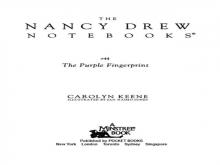 The Purple Fingerprint
The Purple Fingerprint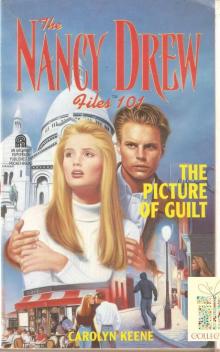 The Picture of Guilt
The Picture of Guilt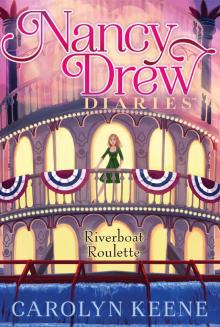 Riverboat Roulette
Riverboat Roulette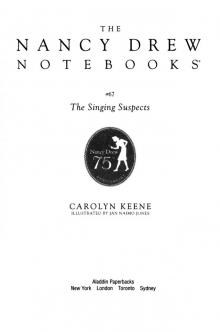 The Singing Suspects
The Singing Suspects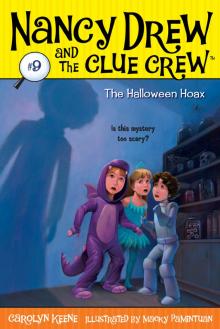 The Halloween Hoax
The Halloween Hoax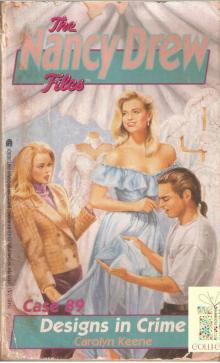 089 Designs in Crime
089 Designs in Crime The Hidden Treasures
The Hidden Treasures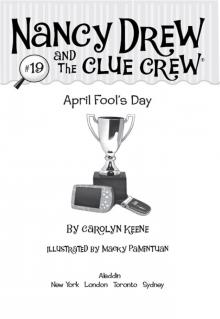 April Fool's Day
April Fool's Day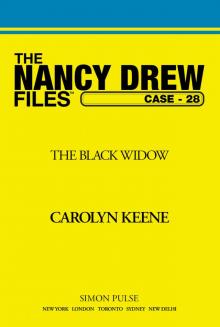 The Black Widow
The Black Widow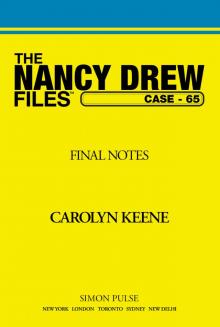 Final Notes
Final Notes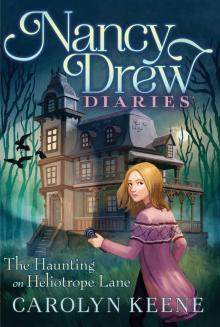 The Haunting on Heliotrope Lane
The Haunting on Heliotrope Lane The Runaway Bride
The Runaway Bride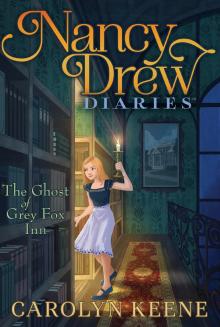 The Ghost of Grey Fox Inn
The Ghost of Grey Fox Inn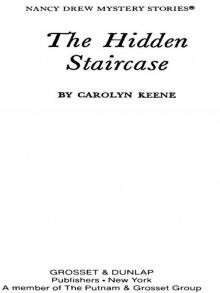 The Hidden Staircase
The Hidden Staircase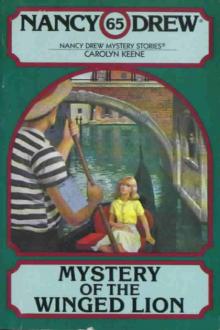 Mystery of the Winged Lion
Mystery of the Winged Lion Over the Edge
Over the Edge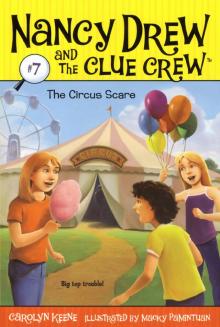 The Circus Scare
The Circus Scare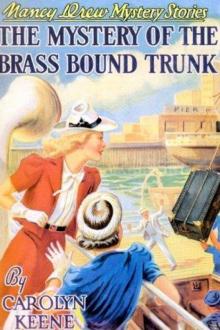 The Mystery of the Brass-Bound Trunk
The Mystery of the Brass-Bound Trunk Ski School Sneak
Ski School Sneak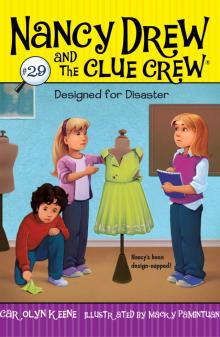 Designed for Disaster
Designed for Disaster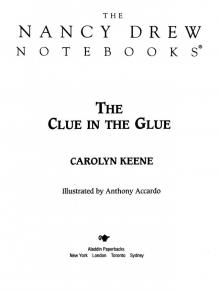 The Clue in the Glue
The Clue in the Glue Cold as Ice
Cold as Ice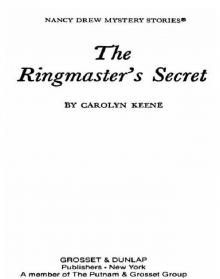 The Ringmaster's Secret
The Ringmaster's Secret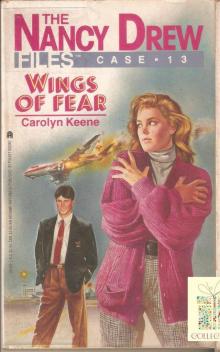 013 Wings of Fear
013 Wings of Fear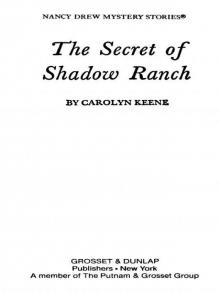 The Secret of Shadow Ranch
The Secret of Shadow Ranch Not Nice on Ice
Not Nice on Ice Earth Day Escapade
Earth Day Escapade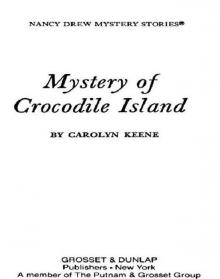 Mystery of Crocodile Island
Mystery of Crocodile Island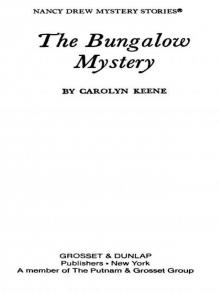 The Bungalow Mystery
The Bungalow Mystery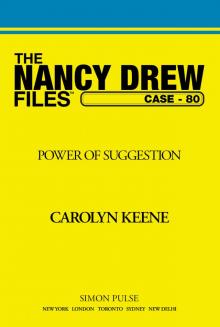 Power of Suggestion
Power of Suggestion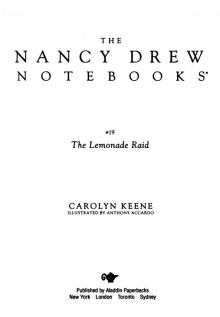 The Lemonade Raid
The Lemonade Raid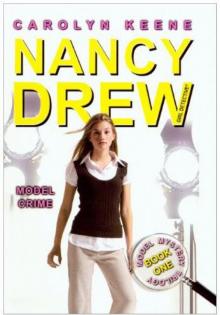 Model Crime
Model Crime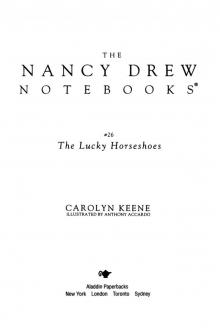 The Lucky Horseshoes
The Lucky Horseshoes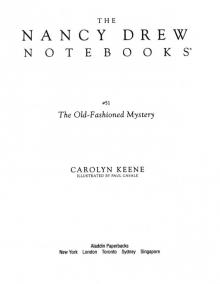 The Secret of the Old Clock
The Secret of the Old Clock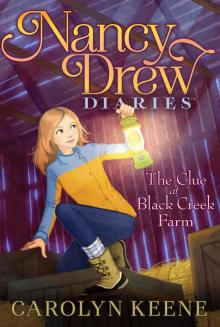 The Clue at Black Creek Farm
The Clue at Black Creek Farm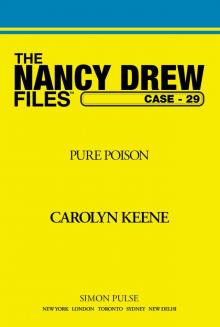 Pure Poison
Pure Poison Nobody's Business
Nobody's Business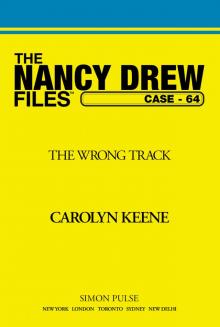 Wrong Track
Wrong Track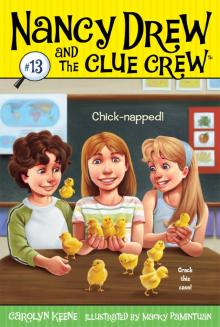 Chick-Napped!
Chick-Napped!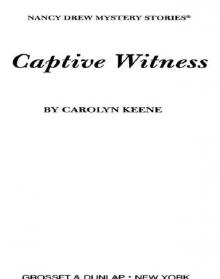 Captive Witness
Captive Witness If Looks Could Kill
If Looks Could Kill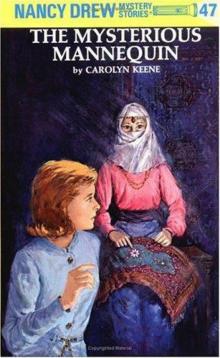 The Mysterious Mannequin
The Mysterious Mannequin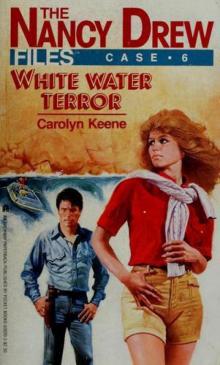 White Water Terror
White Water Terror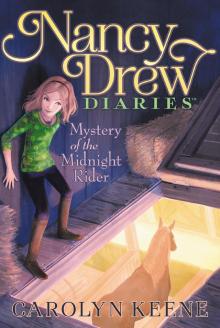 Mystery of the Midnight Rider
Mystery of the Midnight Rider Space Case
Space Case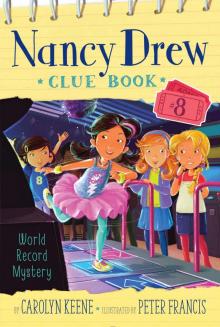 World Record Mystery
World Record Mystery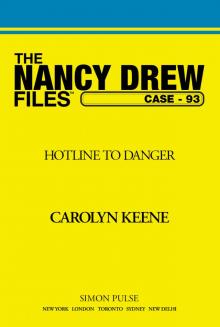 Hotline to Danger
Hotline to Danger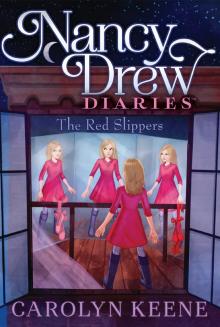 The Red Slippers
The Red Slippers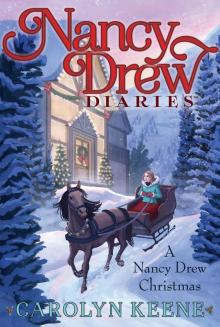 A Crime for Christmas
A Crime for Christmas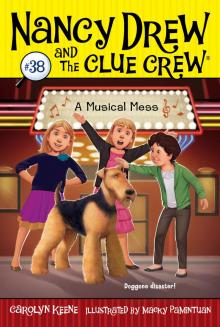 A Musical Mess
A Musical Mess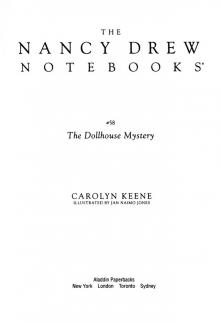 The Dollhouse Mystery
The Dollhouse Mystery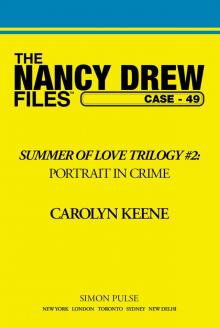 Portrait in Crime
Portrait in Crime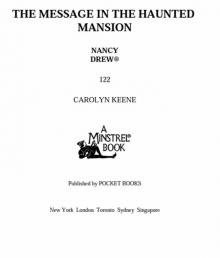 The Message in the Haunted Mansion
The Message in the Haunted Mansion Playing With Fire
Playing With Fire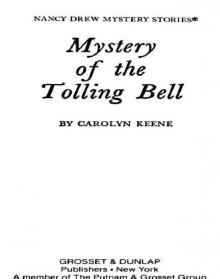 Mystery of the Tolling Bell
Mystery of the Tolling Bell Cutting Edge
Cutting Edge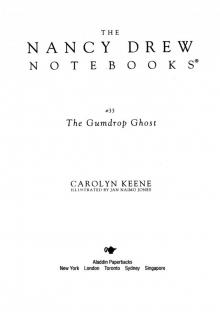 The Gumdrop Ghost
The Gumdrop Ghost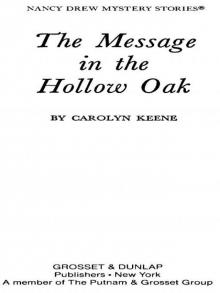 The Message in the Hollow Oak
The Message in the Hollow Oak Trial by Fire
Trial by Fire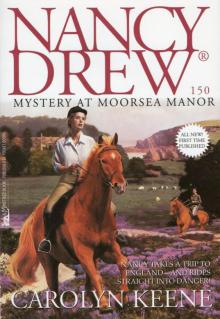 Mystery at Moorsea Manor
Mystery at Moorsea Manor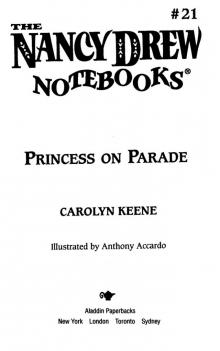 Princess on Parade
Princess on Parade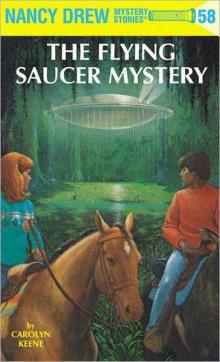 The Flying Saucer Mystery
The Flying Saucer Mystery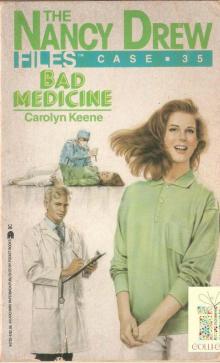 035 Bad Medicine
035 Bad Medicine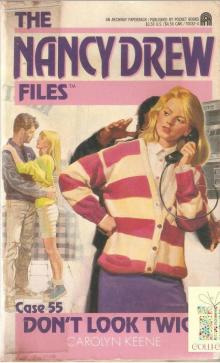 055 Don't Look Twice
055 Don't Look Twice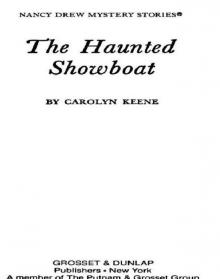 The Haunted Showboat
The Haunted Showboat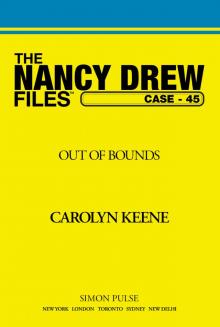 Out of Bounds
Out of Bounds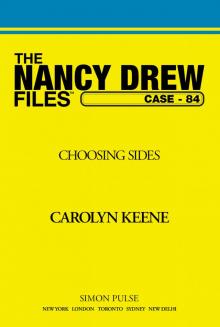 Choosing Sides
Choosing Sides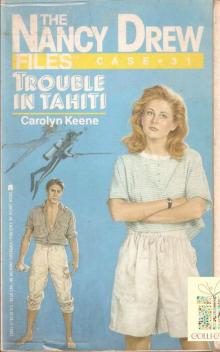 031 Trouble in Tahiti
031 Trouble in Tahiti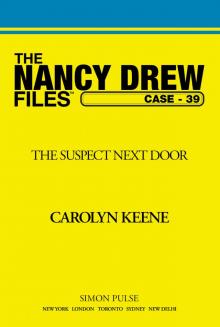 The Suspect Next Door
The Suspect Next Door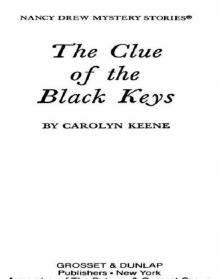 The Clue of the Black Keys
The Clue of the Black Keys The Secret Santa
The Secret Santa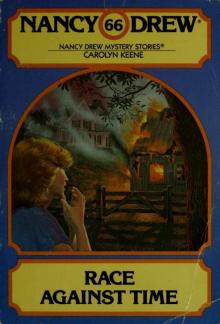 Race Against Time
Race Against Time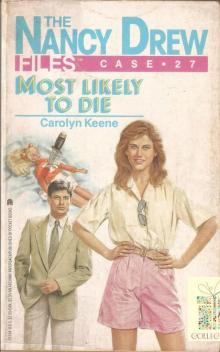 027 Most Likely to Die
027 Most Likely to Die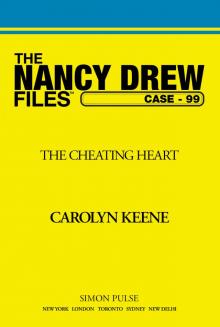 The Cheating Heart
The Cheating Heart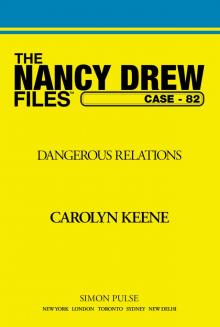 Dangerous Relations
Dangerous Relations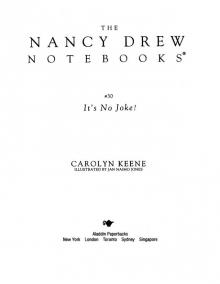 It's No Joke!
It's No Joke!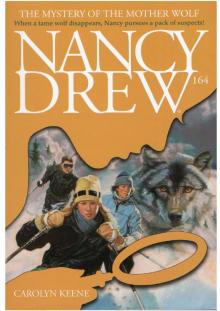 The Mystery of the Mother Wolf
The Mystery of the Mother Wolf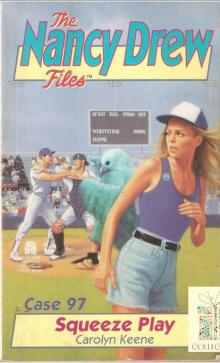 097 Squeeze Play
097 Squeeze Play Secret at Mystic Lake
Secret at Mystic Lake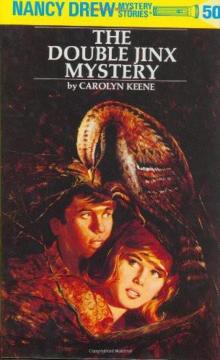 The Double Jinx Mystery
The Double Jinx Mystery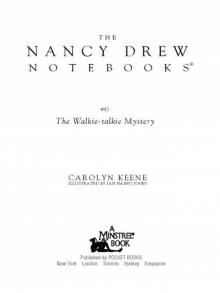 The Walkie Talkie Mystery
The Walkie Talkie Mystery The Case of the Vanishing Veil
The Case of the Vanishing Veil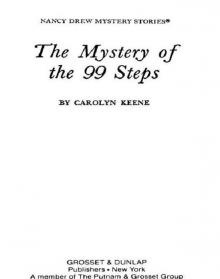 The Mystery of the 99 Steps
The Mystery of the 99 Steps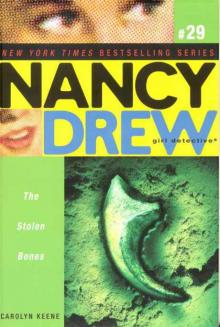 The Stolen Bones
The Stolen Bones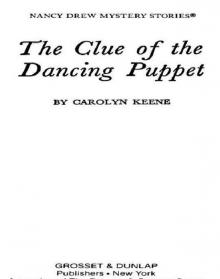 The Clue of the Dancing Puppet
The Clue of the Dancing Puppet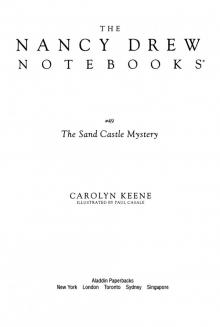 The Sand Castle Mystery
The Sand Castle Mystery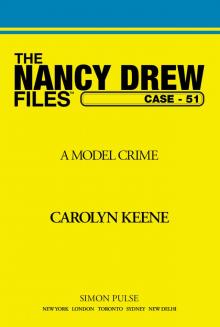 A Model Crime
A Model Crime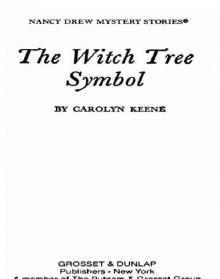 The Witch Tree Symbol
The Witch Tree Symbol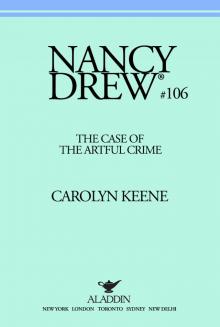 The Case of the Artful Crime
The Case of the Artful Crime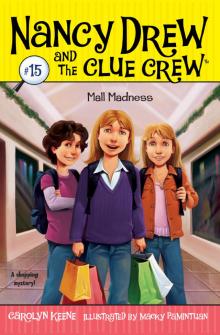 Mall Madness
Mall Madness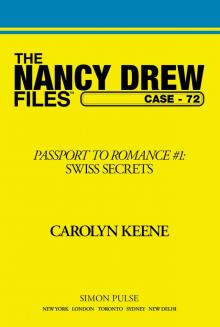 Swiss Secrets
Swiss Secrets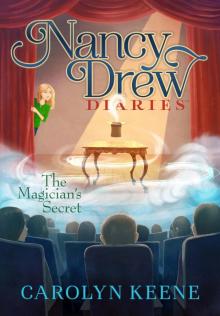 The Magician's Secret
The Magician's Secret Tall, Dark and Deadly
Tall, Dark and Deadly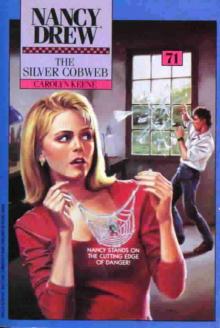 The Silver Cobweb
The Silver Cobweb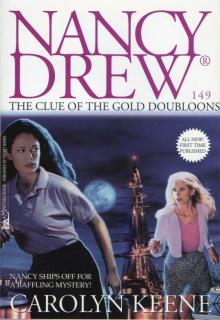 The Clue of the Gold Doubloons
The Clue of the Gold Doubloons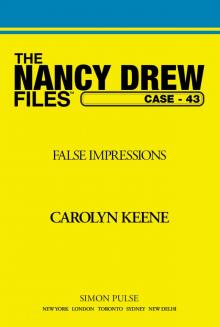 False Impressions
False Impressions Model Suspect
Model Suspect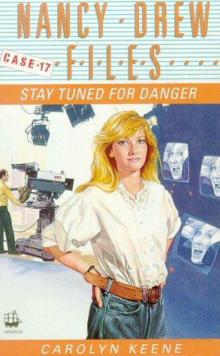 Stay Tuned for Danger
Stay Tuned for Danger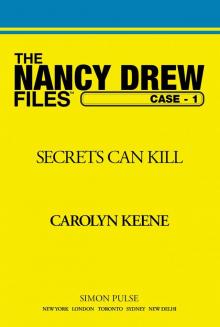 Secrets Can Kill
Secrets Can Kill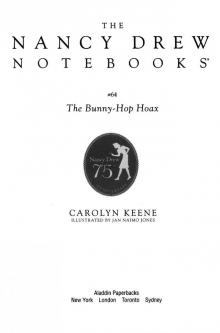 The Bunny-Hop Hoax
The Bunny-Hop Hoax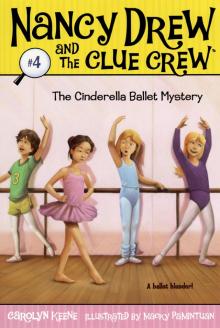 The Cinderella Ballet Mystery
The Cinderella Ballet Mystery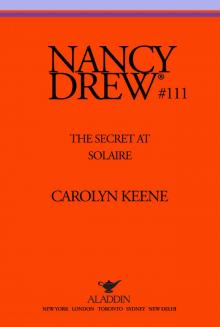 The Secret at Solaire
The Secret at Solaire Trash or Treasure?
Trash or Treasure?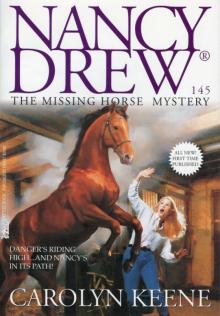 The Missing Horse Mystery
The Missing Horse Mystery The Lost Locket
The Lost Locket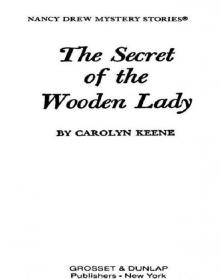 The Secret of the Wooden Lady
The Secret of the Wooden Lady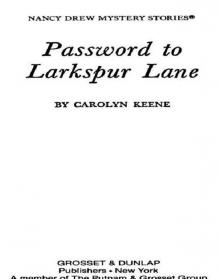 Password to Larkspur Lane
Password to Larkspur Lane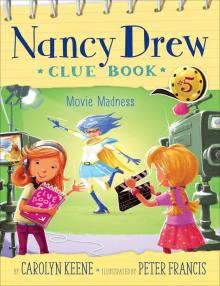 Movie Madness
Movie Madness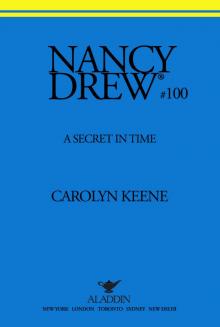 A Secret in Time
A Secret in Time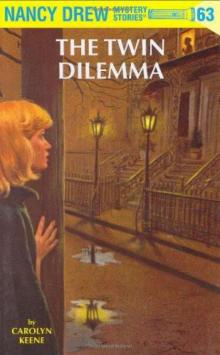 The Twin Dilemma
The Twin Dilemma Candy Is Dandy
Candy Is Dandy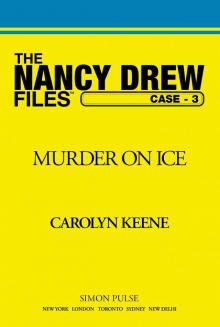 Murder on Ice
Murder on Ice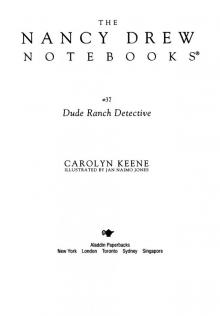 Dude Ranch Detective
Dude Ranch Detective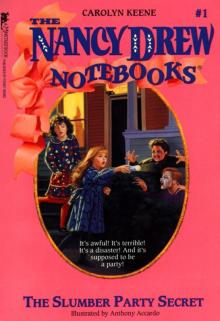 The Slumber Party Secret
The Slumber Party Secret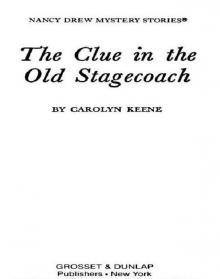 The Clue in the Old Stagecoach
The Clue in the Old Stagecoach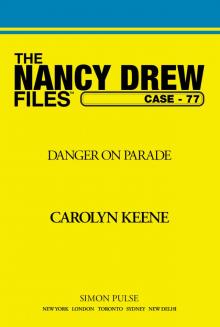 Danger on Parade
Danger on Parade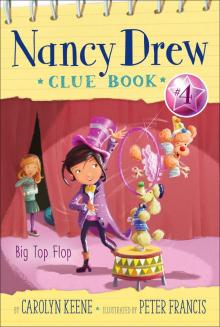 Big Top Flop
Big Top Flop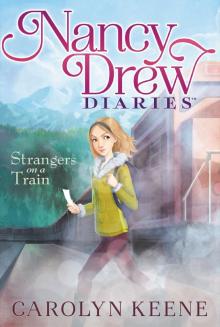 Strangers on a Train
Strangers on a Train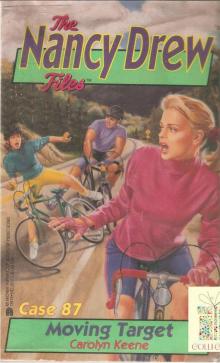 087 Moving Target
087 Moving Target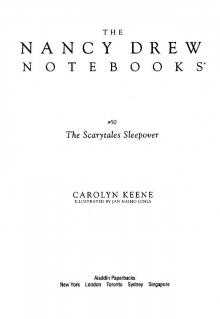 The Scarytales Sleepover
The Scarytales Sleepover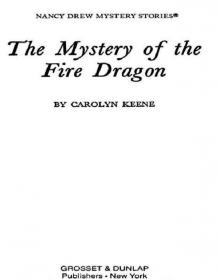 The Mystery of the Fire Dragon
The Mystery of the Fire Dragon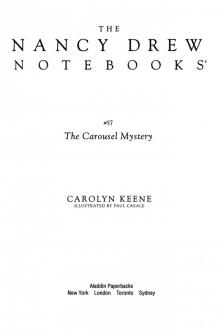 The Carousel Mystery
The Carousel Mystery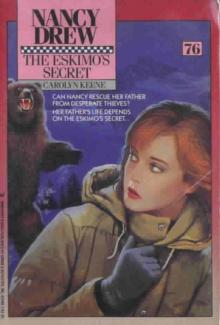 The Eskimo's Secret
The Eskimo's Secret Thrill on the Hill
Thrill on the Hill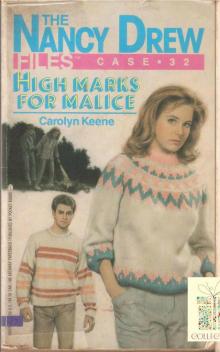 032 High Marks for Malice
032 High Marks for Malice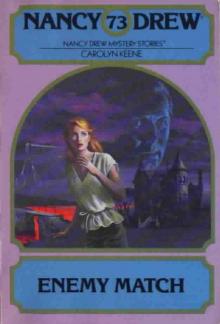 Enemy Match
Enemy Match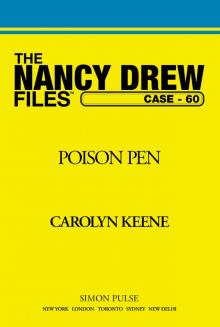 Poison Pen
Poison Pen Lights, Camera . . . Cats!
Lights, Camera . . . Cats! Lost in the Everglades
Lost in the Everglades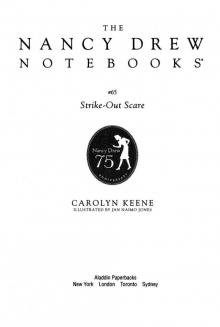 Strike-Out Scare
Strike-Out Scare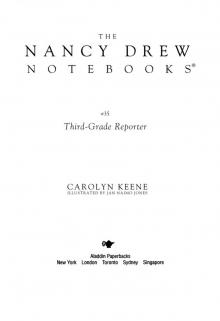 Third-Grade Reporter
Third-Grade Reporter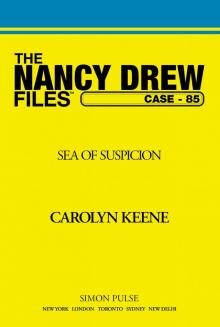 Sea of Suspicion
Sea of Suspicion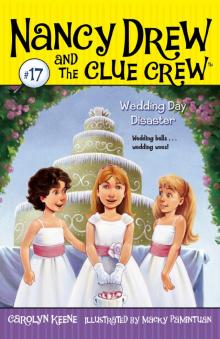 Wedding Day Disaster
Wedding Day Disaster The Make-A-Pet Mystery
The Make-A-Pet Mystery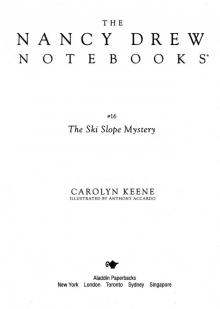 The Ski Slope Mystery
The Ski Slope Mystery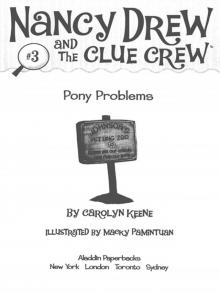 Pony Problems
Pony Problems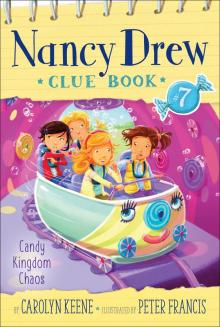 Candy Kingdom Chaos
Candy Kingdom Chaos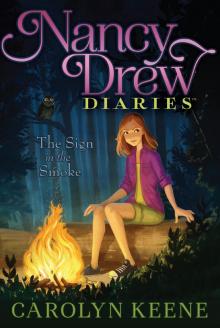 The Sign in the Smoke
The Sign in the Smoke The Wrong Chemistry
The Wrong Chemistry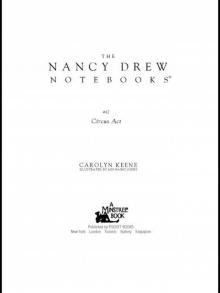 Circus Act
Circus Act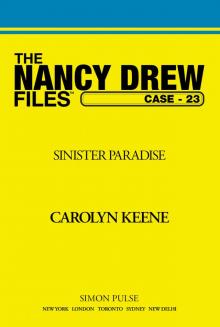 Sinister Paradise
Sinister Paradise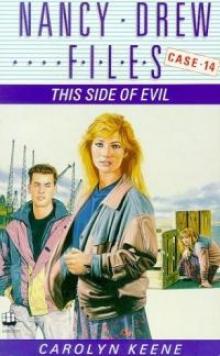 This Side of Evil
This Side of Evil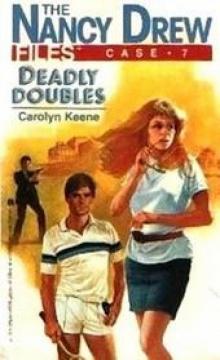 Deadly Doubles
Deadly Doubles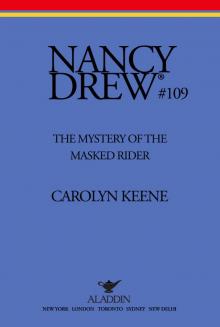 The Mystery of the Masked Rider
The Mystery of the Masked Rider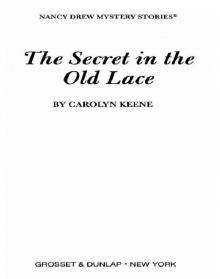 The Secret in the Old Lace
The Secret in the Old Lace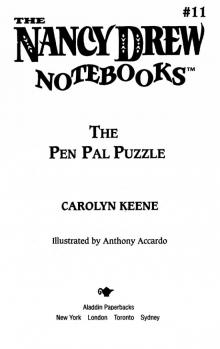 The Pen Pal Puzzle
The Pen Pal Puzzle Without a Trace
Without a Trace Whose Pet Is Best?
Whose Pet Is Best?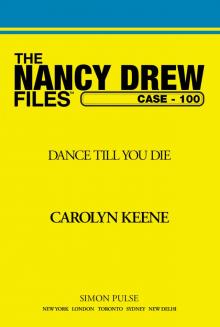 Dance Till You Die
Dance Till You Die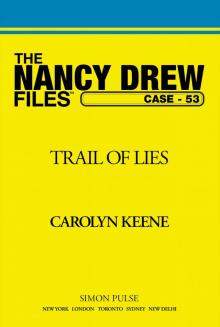 Trail of Lies
Trail of Lies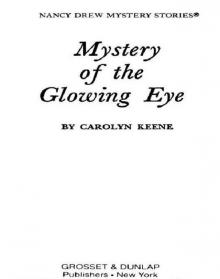 Mystery of the Glowing Eye
Mystery of the Glowing Eye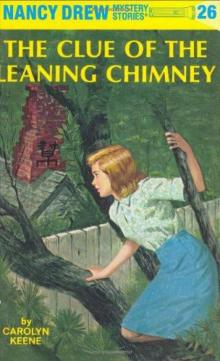 The Clue of the Leaning Chimney
The Clue of the Leaning Chimney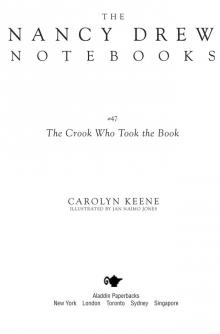 The Crook Who Took the Book
The Crook Who Took the Book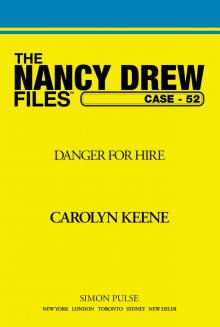 Danger for Hire
Danger for Hire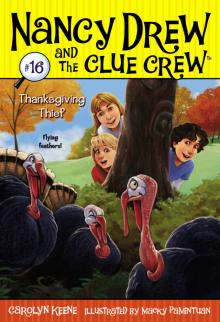 Thanksgiving Thief
Thanksgiving Thief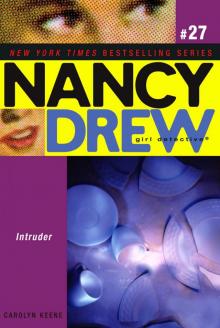 Intruder!
Intruder!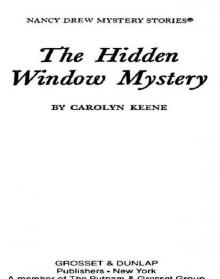 The Hidden Window Mystery
The Hidden Window Mystery Win, Place or Die
Win, Place or Die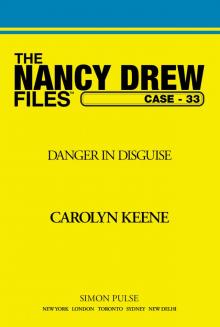 Danger in Disguise
Danger in Disguise The Best Detective
The Best Detective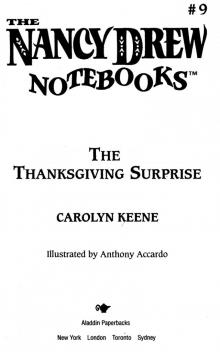 The Thanksgiving Surprise
The Thanksgiving Surprise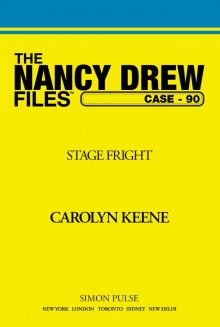 Stage Fright
Stage Fright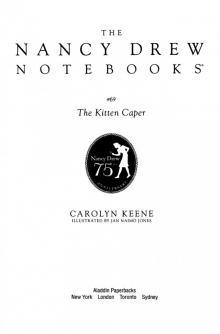 The Kitten Caper
The Kitten Caper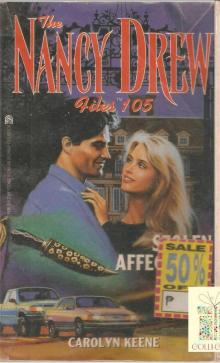 Stolen Affections
Stolen Affections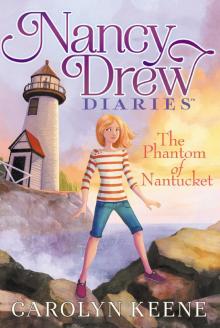 The Phantom of Nantucket
The Phantom of Nantucket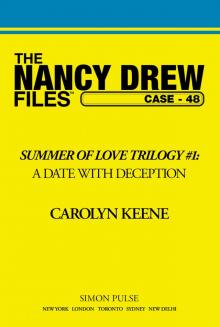 Date With Deception
Date With Deception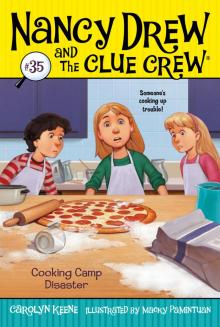 Cooking Camp Disaster
Cooking Camp Disaster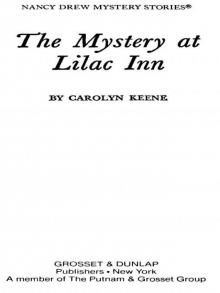 The Mystery at Lilac Inn
The Mystery at Lilac Inn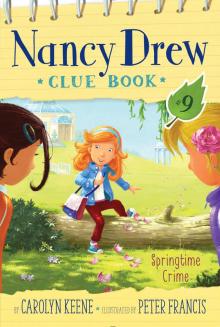 Springtime Crime
Springtime Crime Action!
Action! Into Thin Air
Into Thin Air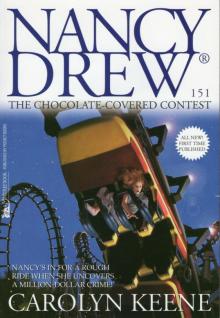 The Chocolate-Covered Contest
The Chocolate-Covered Contest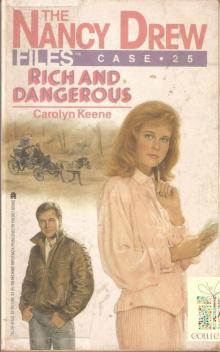 025 Rich and Dangerous
025 Rich and Dangerous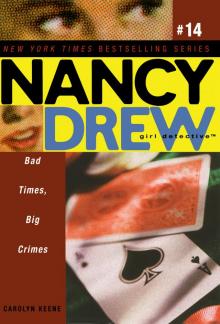 Bad Times, Big Crimes
Bad Times, Big Crimes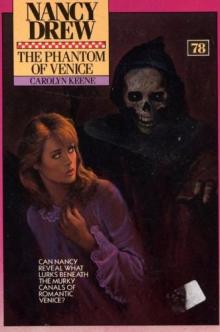 078 The Phantom Of Venice
078 The Phantom Of Venice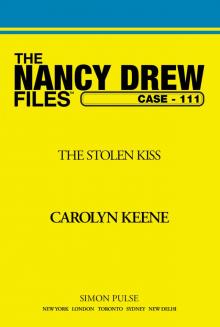 The Stolen Kiss
The Stolen Kiss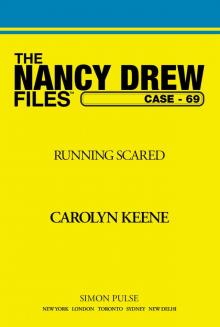 Running Scared
Running Scared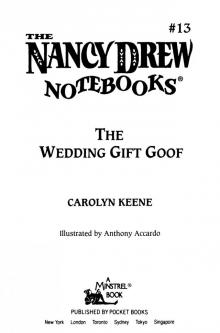 The Wedding Gift Goof
The Wedding Gift Goof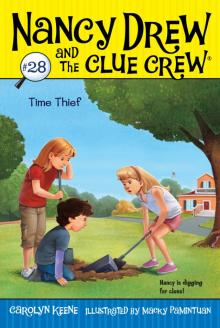 Time Thief
Time Thief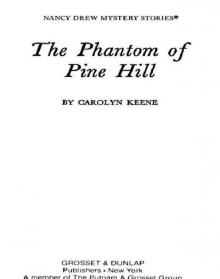 The Phantom of Pine Hill
The Phantom of Pine Hill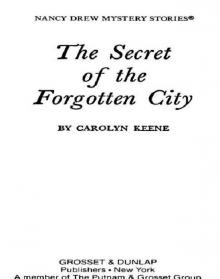 The Secret of the Forgotten City
The Secret of the Forgotten City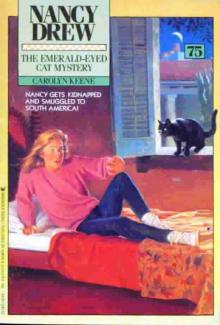 The Emerald-Eyed Cat Mystery
The Emerald-Eyed Cat Mystery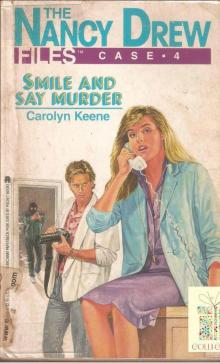 004 Smile and Say Murder
004 Smile and Say Murder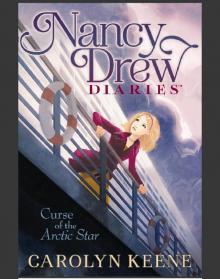 Curse of the Arctic Star
Curse of the Arctic Star Dinosaur Alert!
Dinosaur Alert!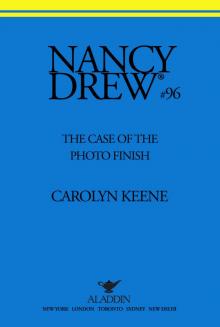 The Case of the Photo Finish
The Case of the Photo Finish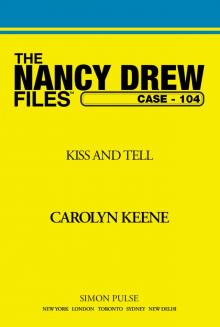 Kiss and Tell
Kiss and Tell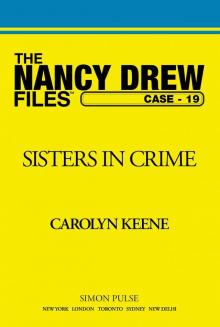 Sisters in Crime
Sisters in Crime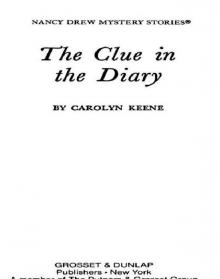 The Clue in the Diary
The Clue in the Diary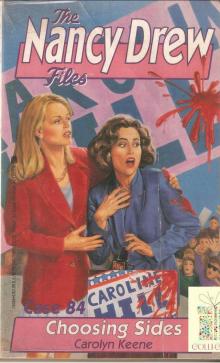 084 Choosing Sides
084 Choosing Sides Haunting of Horse Island
Haunting of Horse Island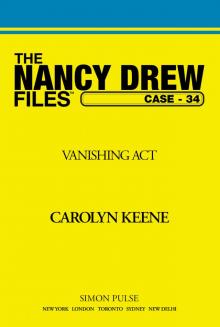 Vanishing Act
Vanishing Act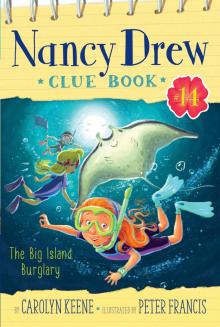 The Big Island Burglary
The Big Island Burglary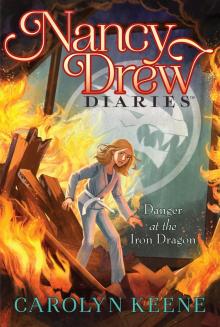 Danger at the Iron Dragon
Danger at the Iron Dragon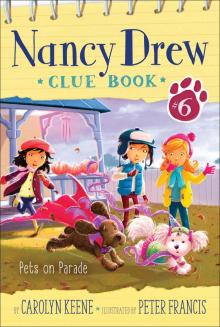 Pets on Parade
Pets on Parade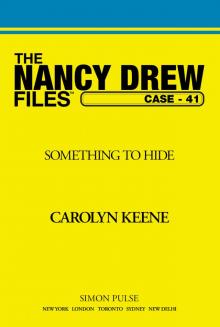 Something to Hide
Something to Hide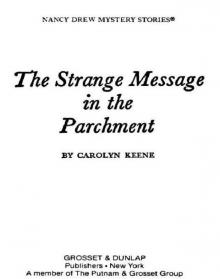 The Strange Message in the Parchment
The Strange Message in the Parchment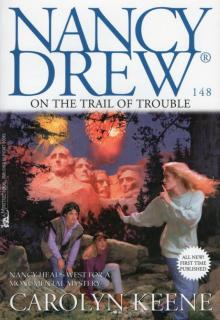 On the Trail of Trouble
On the Trail of Trouble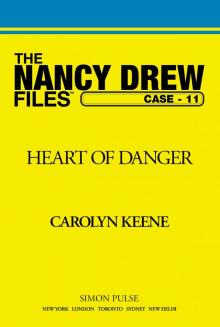 Heart of Danger
Heart of Danger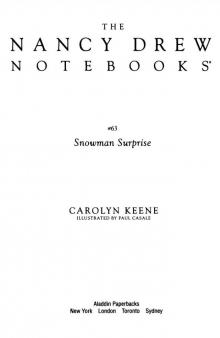 The Snowman Surprise
The Snowman Surprise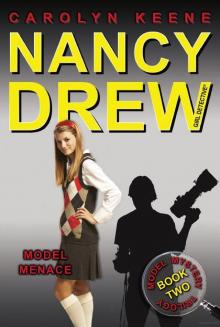 Model Menace
Model Menace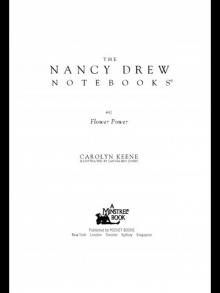 Flower Power
Flower Power The Great Goat Gaffe
The Great Goat Gaffe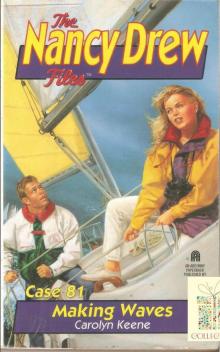 081 Making Waves
081 Making Waves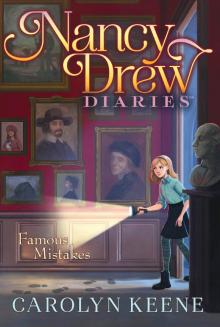 Famous Mistakes
Famous Mistakes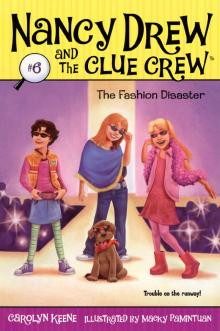 The Fashion Disaster
The Fashion Disaster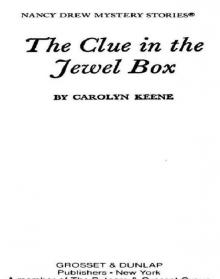 The Clue in the Jewel Box
The Clue in the Jewel Box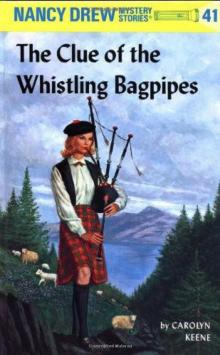 The Clue of the Whistling Bagpipes
The Clue of the Whistling Bagpipes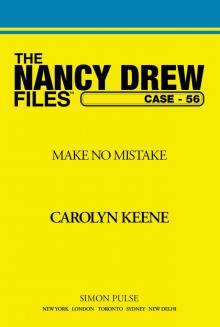 Make No Mistake
Make No Mistake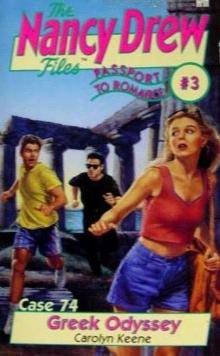 Greek Odyssey
Greek Odyssey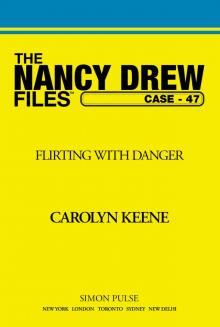 Flirting With Danger
Flirting With Danger Double Take
Double Take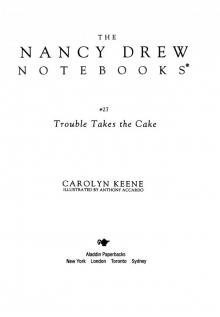 Trouble Takes the Cake
Trouble Takes the Cake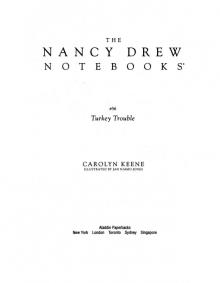 Turkey Trouble
Turkey Trouble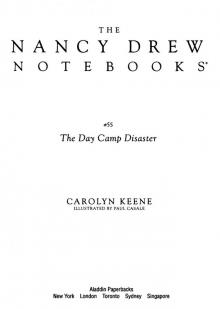 The Day Camp Disaster
The Day Camp Disaster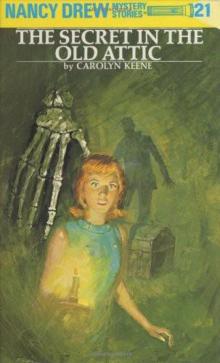 The Secret in the Old Attic
The Secret in the Old Attic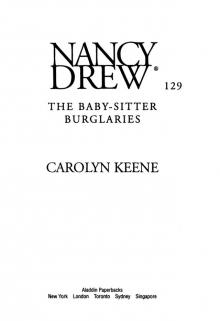 The Baby-Sitter Burglaries
The Baby-Sitter Burglaries Recipe for Murder
Recipe for Murder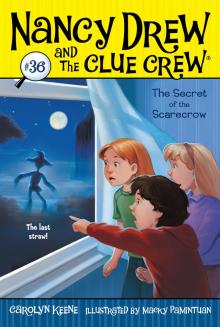 The Secret of the Scarecrow
The Secret of the Scarecrow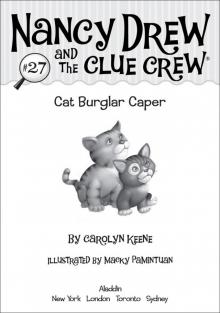 Cat Burglar Caper
Cat Burglar Caper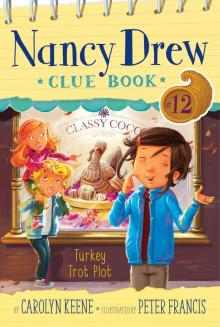 Turkey Trot Plot
Turkey Trot Plot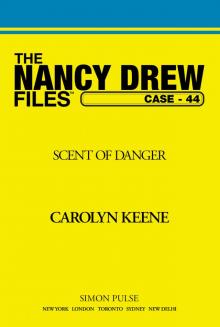 Scent of Danger
Scent of Danger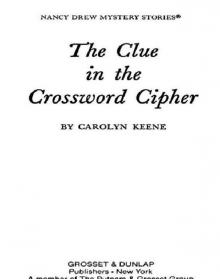 The Clue in the Crossword Cipher
The Clue in the Crossword Cipher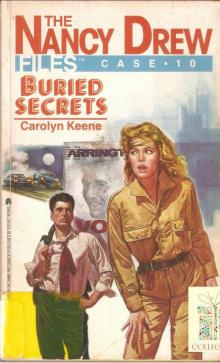 010 Buried Secrets
010 Buried Secrets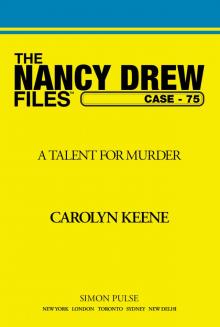 A Talent for Murder
A Talent for Murder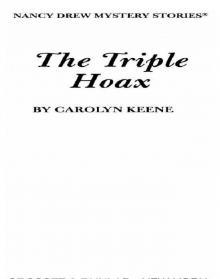 The Triple Hoax
The Triple Hoax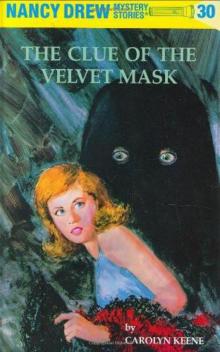 The Clue of the Velvet Mask
The Clue of the Velvet Mask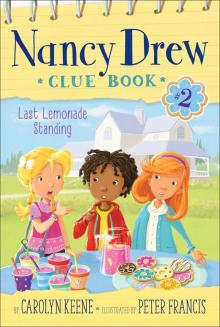 Last Lemonade Standing
Last Lemonade Standing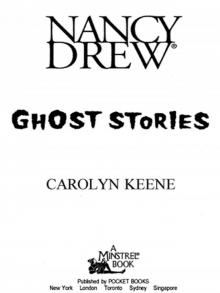 The Ghost of Blackwood Hall
The Ghost of Blackwood Hall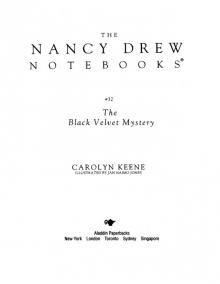 The Black Velvet Mystery
The Black Velvet Mystery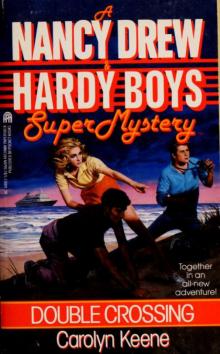 Double Crossing
Double Crossing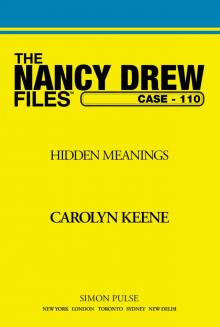 Hidden Meanings
Hidden Meanings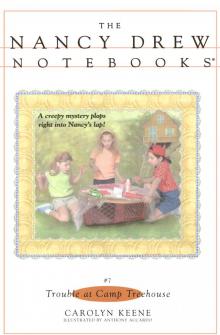 Trouble at Camp Treehouse
Trouble at Camp Treehouse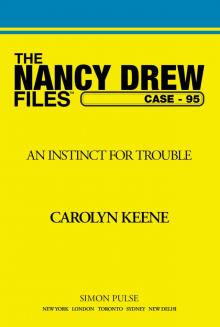 An Instinct for Trouble
An Instinct for Trouble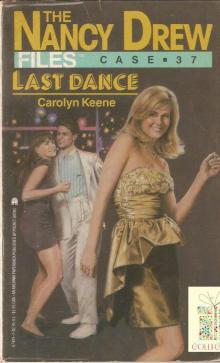 037 Last Dance
037 Last Dance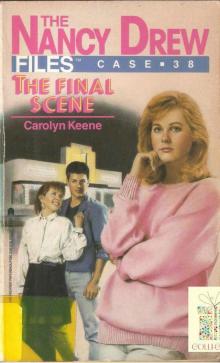 038 The Final Scene
038 The Final Scene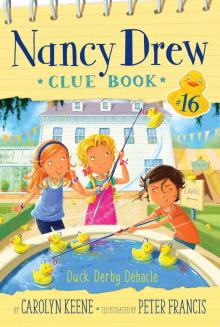 Duck Derby Debacle
Duck Derby Debacle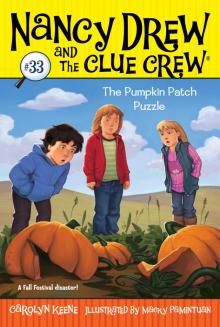 The Pumpkin Patch Puzzle
The Pumpkin Patch Puzzle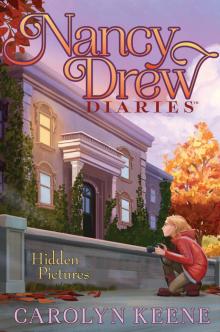 Hidden Pictures
Hidden Pictures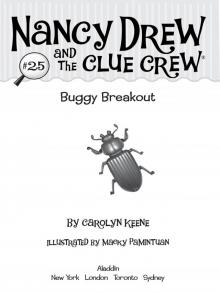 Buggy Breakout
Buggy Breakout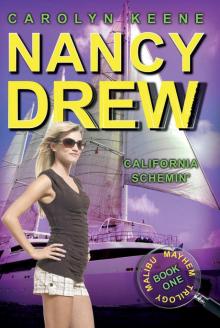 California Schemin'
California Schemin'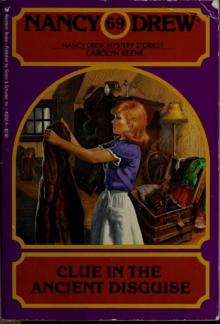 Clue in the Ancient Disguise
Clue in the Ancient Disguise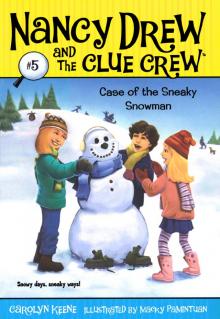 Case of the Sneaky Snowman
Case of the Sneaky Snowman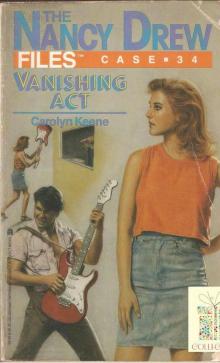 034 Vanishing Act
034 Vanishing Act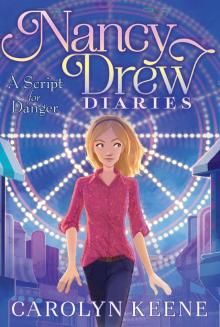 A Script for Danger
A Script for Danger The Flower Show Fiasco
The Flower Show Fiasco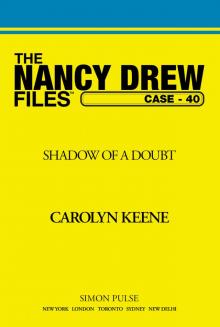 Shadow of a Doubt
Shadow of a Doubt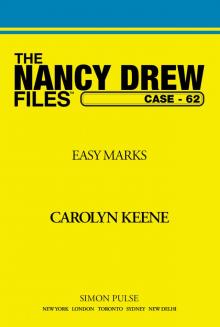 Easy Marks
Easy Marks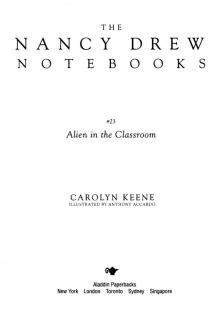 Alien in the Classroom
Alien in the Classroom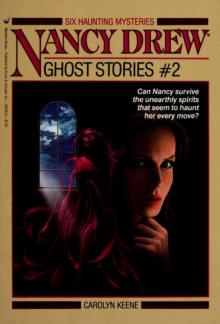 Ghost Stories, #2 (Nancy Drew)
Ghost Stories, #2 (Nancy Drew)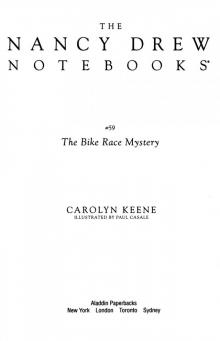 The Bike Race Mystery
The Bike Race Mystery False Pretenses
False Pretenses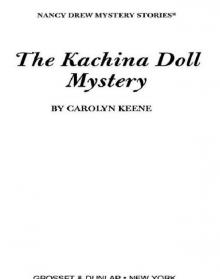 The Kachina Doll Mystery
The Kachina Doll Mystery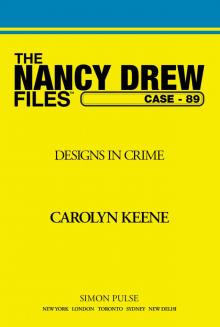 Designs in Crime
Designs in Crime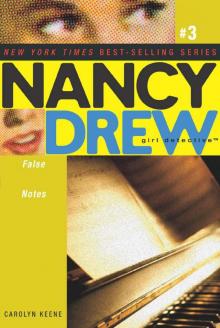 False Notes
False Notes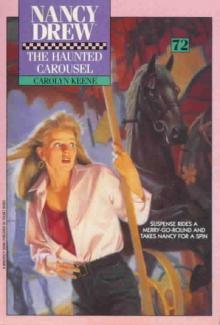 The Haunted Carousel
The Haunted Carousel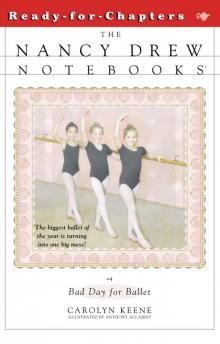 Bad Day for Ballet
Bad Day for Ballet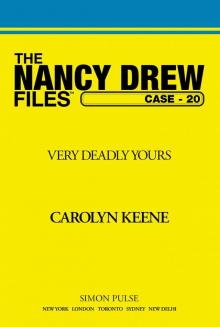 Very Deadly Yours
Very Deadly Yours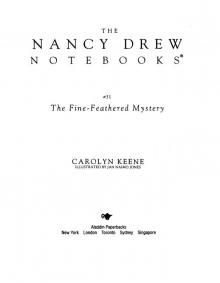 The Fine-Feathered Mystery
The Fine-Feathered Mystery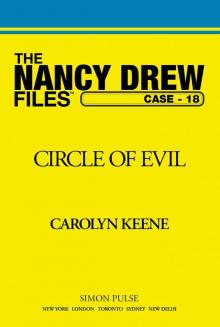 Circle of Evil
Circle of Evil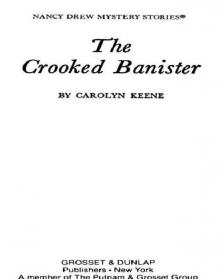 The Crooked Banister
The Crooked Banister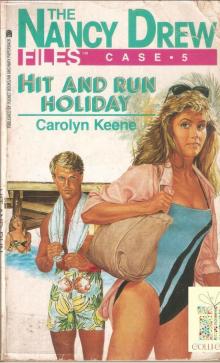 005 Hit and Run Holiday
005 Hit and Run Holiday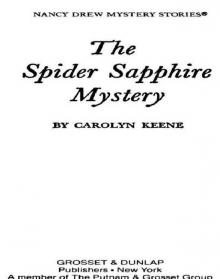 The Spider Sapphire Mystery
The Spider Sapphire Mystery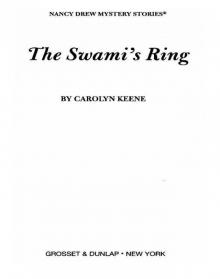 The Swami's Ring
The Swami's Ring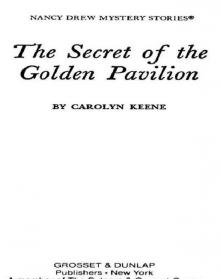 The Secret of the Golden Pavilion
The Secret of the Golden Pavilion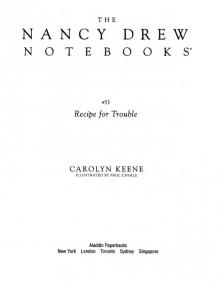 Recipe for Trouble
Recipe for Trouble Betrayed by Love
Betrayed by Love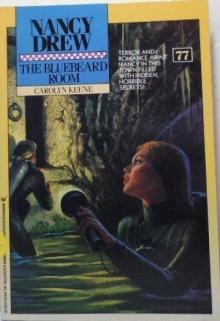 The Bluebeard Room
The Bluebeard Room Sweet Revenge
Sweet Revenge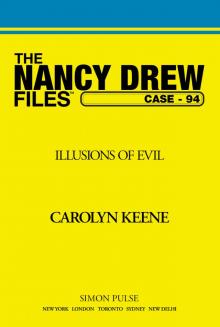 Illusions of Evil
Illusions of Evil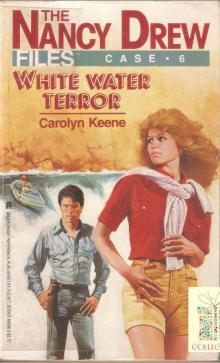 006 White Water Terror
006 White Water Terror High Risk
High Risk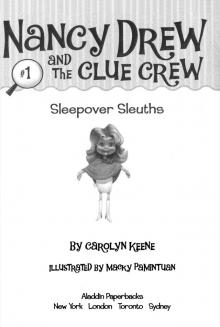 Sleepover Sleuths
Sleepover Sleuths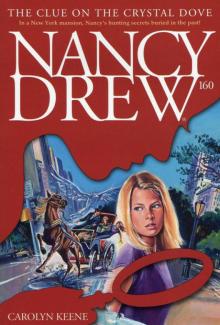 The Clue on the Crystal Dove
The Clue on the Crystal Dove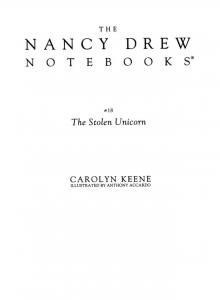 The Stolen Unicorn
The Stolen Unicorn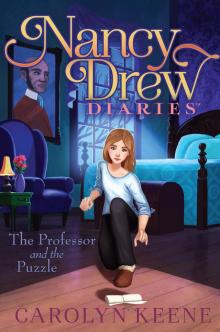 The Professor and the Puzzle
The Professor and the Puzzle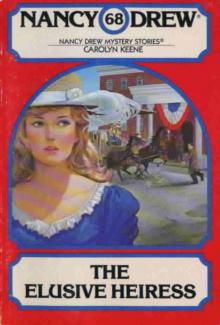 The Elusive Heiress
The Elusive Heiress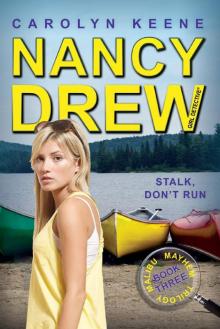 Stalk, Don't Run
Stalk, Don't Run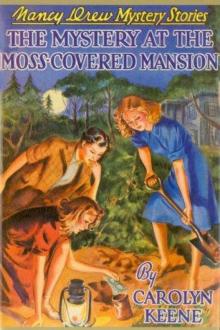 The Mystery at the Moss-Covered Mansion
The Mystery at the Moss-Covered Mansion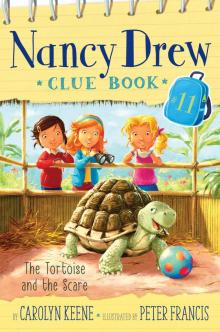 The Tortoise and the Scare
The Tortoise and the Scare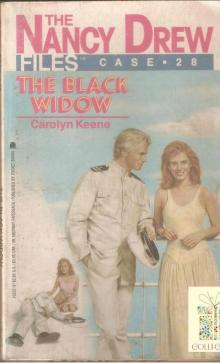 028 The Black Widow
028 The Black Widow Big Worry in Wonderland
Big Worry in Wonderland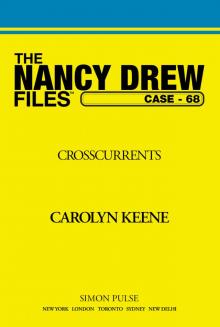 Crosscurrents
Crosscurrents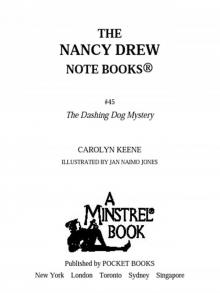 The Dashing Dog Mystery
The Dashing Dog Mystery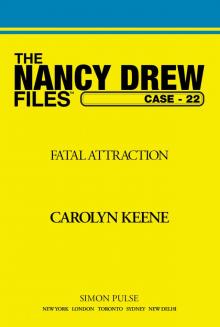 Fatal Attraction
Fatal Attraction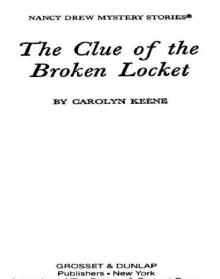 The Clue of the Broken Locket
The Clue of the Broken Locket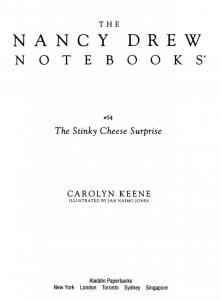 The Stinky Cheese Surprise
The Stinky Cheese Surprise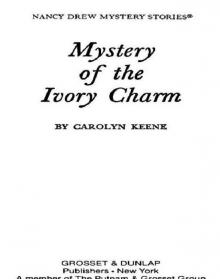 Mystery of the Ivory Charm
Mystery of the Ivory Charm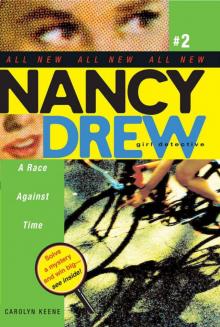 A Race Against Time
A Race Against Time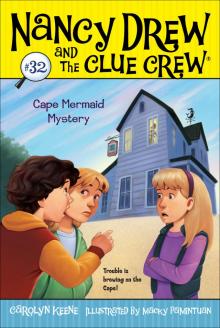 Cape Mermaid Mystery
Cape Mermaid Mystery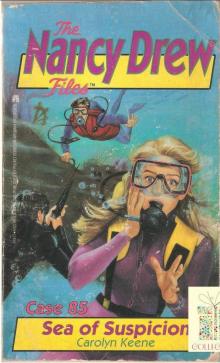 085 Sea of Suspicion
085 Sea of Suspicion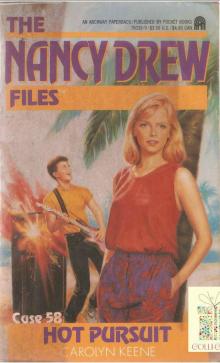 058 Hot Pursuit
058 Hot Pursuit The Secret in the Spooky Woods
The Secret in the Spooky Woods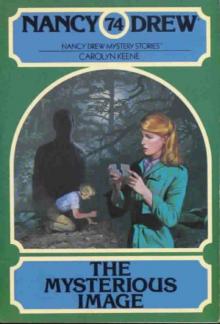 The Mysterious Image
The Mysterious Image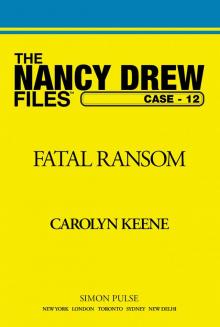 Fatal Ransom
Fatal Ransom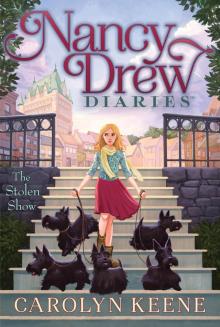 The Stolen Show
The Stolen Show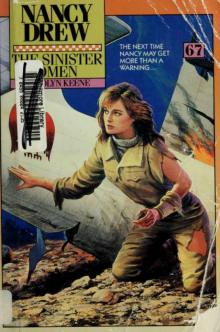 The Sinister Omen
The Sinister Omen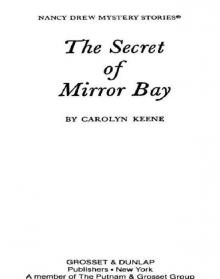 The Secret of Mirror Bay
The Secret of Mirror Bay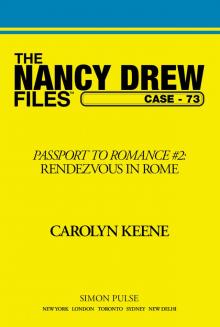 Rendezvous in Rome
Rendezvous in Rome The Perfect Plot
The Perfect Plot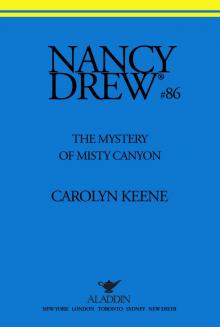 The Mystery of Misty Canyon
The Mystery of Misty Canyon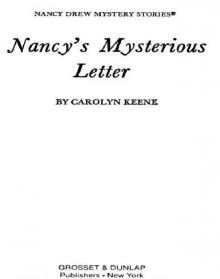 Nancy's Mysterious Letter
Nancy's Mysterious Letter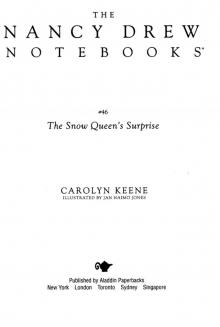 The Snow Queen's Surprise
The Snow Queen's Surprise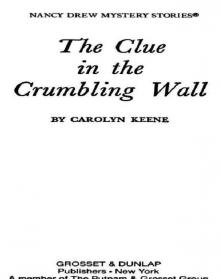 The Clue in the Crumbling Wall
The Clue in the Crumbling Wall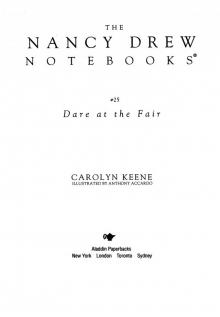 Dare at the Fair
Dare at the Fair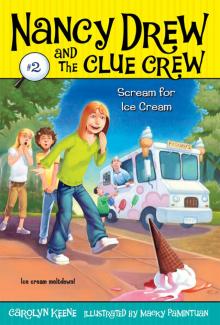 Scream for Ice Cream
Scream for Ice Cream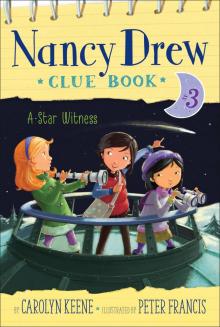 A Star Witness
A Star Witness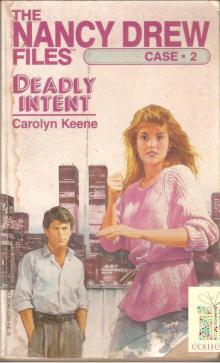 002 Deadly Intent
002 Deadly Intent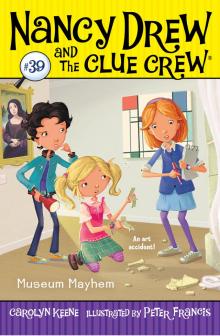 Museum Mayhem
Museum Mayhem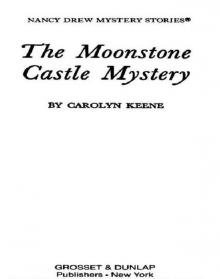 The Moonstone Castle Mystery
The Moonstone Castle Mystery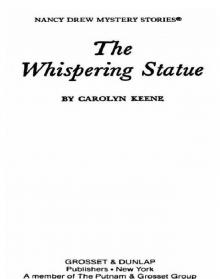 The Whispering Statue
The Whispering Statue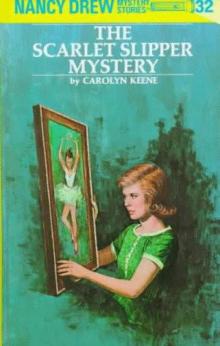 The Scarlet Slipper Mystery
The Scarlet Slipper Mystery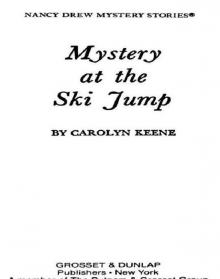 Mystery at the Ski Jump
Mystery at the Ski Jump Hot Pursuit
Hot Pursuit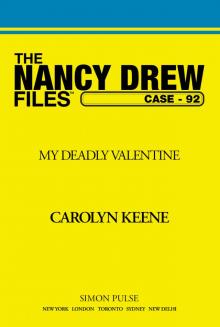 My Deadly Valentine
My Deadly Valentine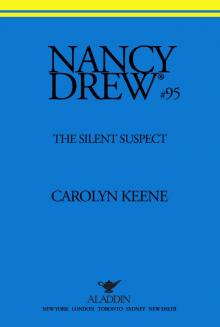 The Silent Suspect
The Silent Suspect Deep Secrets
Deep Secrets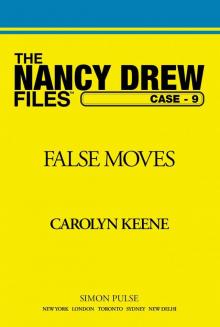 False Moves
False Moves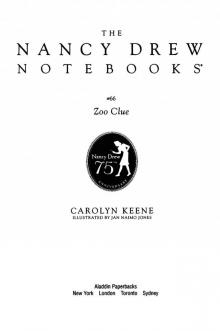 The Zoo Crew
The Zoo Crew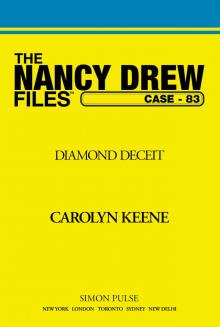 Diamond Deceit
Diamond Deceit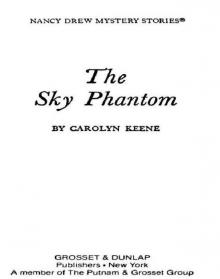 The Sky Phantom
The Sky Phantom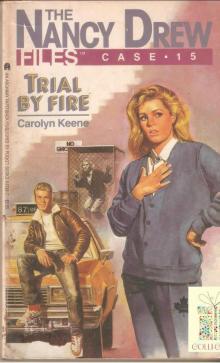 015 Trial by Fire
015 Trial by Fire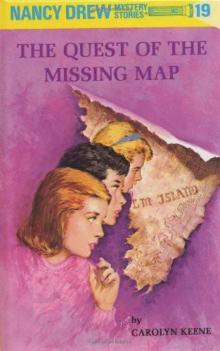 The Quest of the Missing Map
The Quest of the Missing Map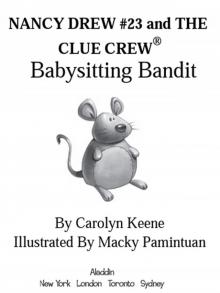 Babysitting Bandit
Babysitting Bandit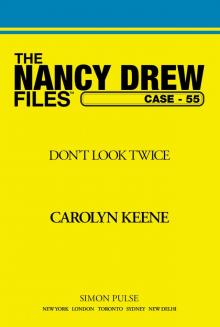 Don't Look Twice
Don't Look Twice Never Say Die
Never Say Die The Soccer Shoe Clue
The Soccer Shoe Clue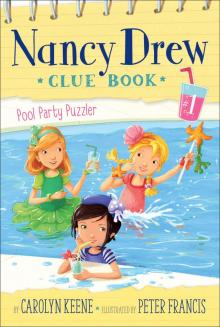 Pool Party Puzzler
Pool Party Puzzler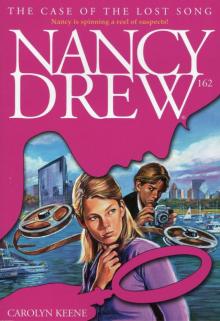 The Case of the Lost Song
The Case of the Lost Song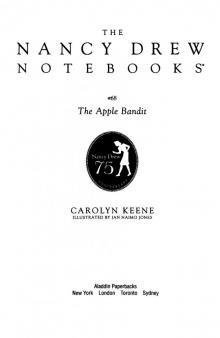 The Apple Bandit
The Apple Bandit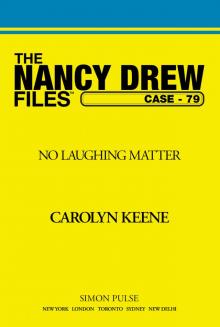 No Laughing Matter
No Laughing Matter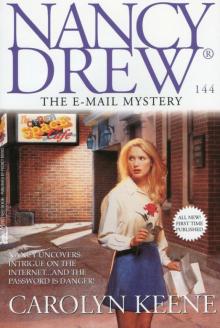 The Thirteenth Pearl
The Thirteenth Pearl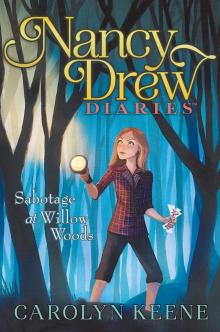 Sabotage at Willow Woods
Sabotage at Willow Woods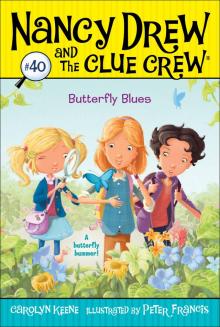 Butterfly Blues
Butterfly Blues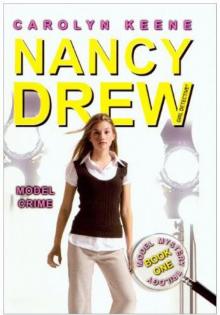 Model Crime 1
Model Crime 1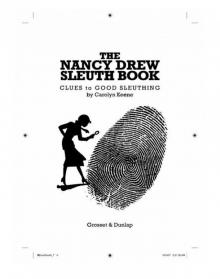 The Nancy Drew Sleuth Book
The Nancy Drew Sleuth Book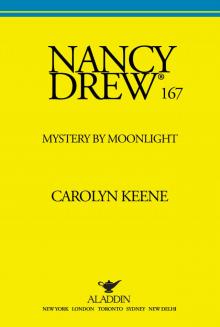 Mystery by Moonlight
Mystery by Moonlight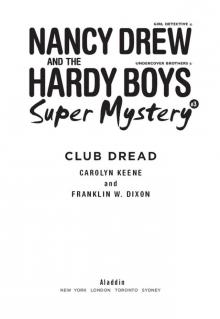 Club Dread
Club Dread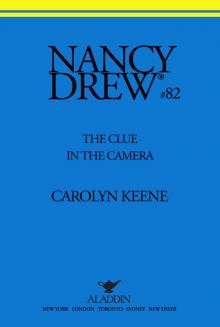 The Clue in the Camera
The Clue in the Camera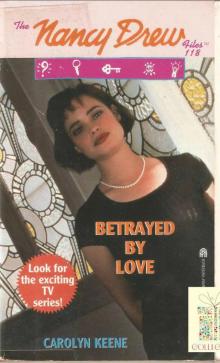 118 Betrayed By Love
118 Betrayed By Love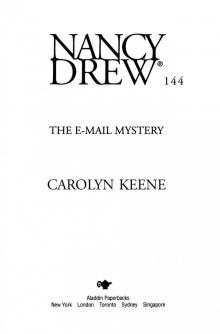 The E-Mail Mystery (Nancy Drew Book 144)
The E-Mail Mystery (Nancy Drew Book 144)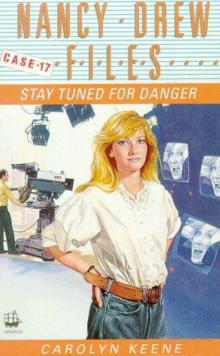 Stay Tuned for Danger: Circle of Evil
Stay Tuned for Danger: Circle of Evil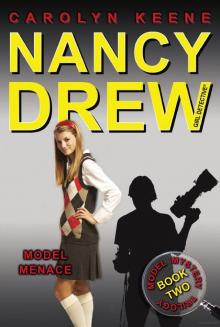 Model Menace 2
Model Menace 2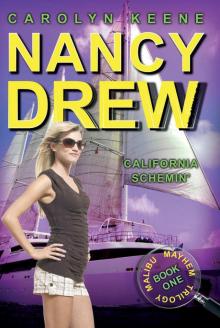 California Schemin': Book One in the Malibu Mayhem Trilogy
California Schemin': Book One in the Malibu Mayhem Trilogy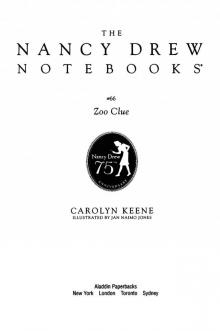 Zoo Clue (Nancy Drew Notebooks)
Zoo Clue (Nancy Drew Notebooks)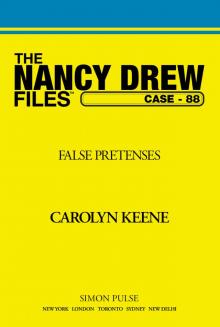 False Pretences
False Pretences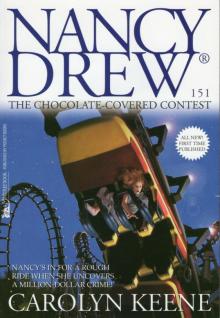 151 The Chocolate-Covered Contest
151 The Chocolate-Covered Contest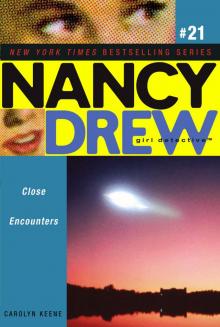 Close Encounters
Close Encounters The Emeral-Eyed Cat Mystery
The Emeral-Eyed Cat Mystery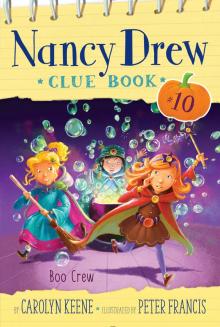 Boo Crew
Boo Crew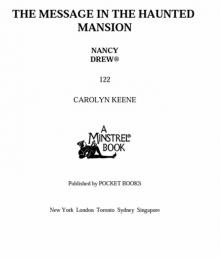 The Message in the Haunted Mansion (Nancy Drew Book 122)
The Message in the Haunted Mansion (Nancy Drew Book 122)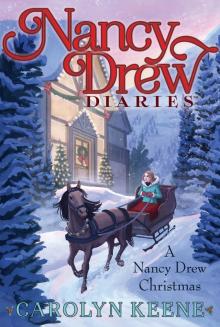 A Nancy Drew Christmas
A Nancy Drew Christmas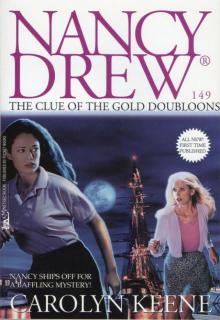 149 The Clue Of The Gold Doubloons
149 The Clue Of The Gold Doubloons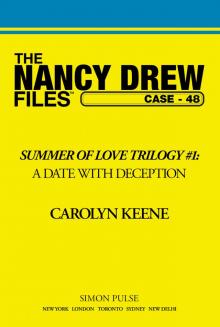 A Date with Deception
A Date with Deception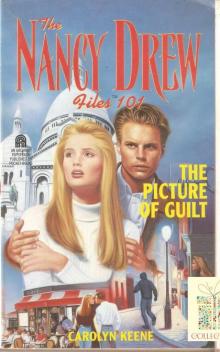 101 The Picture of Guilt
101 The Picture of Guilt The Secret in the Spooky Woods (Nancy Drew Notebooks Book 62)
The Secret in the Spooky Woods (Nancy Drew Notebooks Book 62)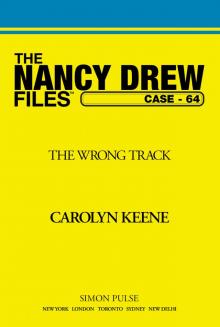 The Wrong Track
The Wrong Track Lights! Camera! Clues!
Lights! Camera! Clues!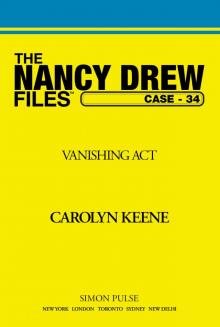 The Vanishing Act
The Vanishing Act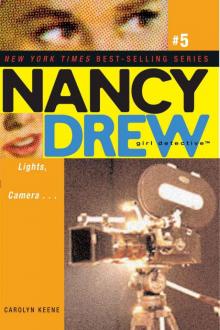 Lights, Camera . . .
Lights, Camera . . . Model Suspect 3
Model Suspect 3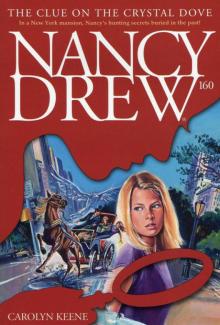 160 The Clue On The Crystal Dove
160 The Clue On The Crystal Dove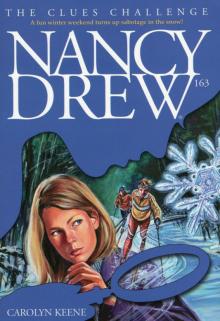 163 The Clues Challenge
163 The Clues Challenge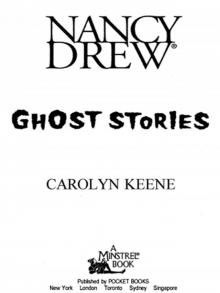 Ghost Stories (Nancy Drew)
Ghost Stories (Nancy Drew) Space Case (Nancy Drew Notebooks Book 61)
Space Case (Nancy Drew Notebooks Book 61)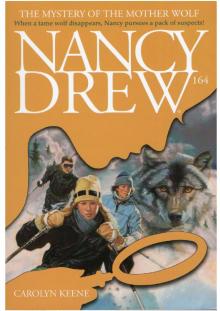 164 The Mystery Of The Mother Wolf
164 The Mystery Of The Mother Wolf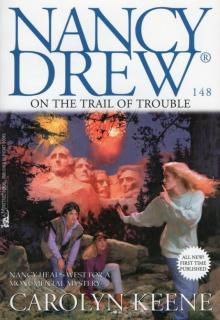 148 On The Trail Of Trouble
148 On The Trail Of Trouble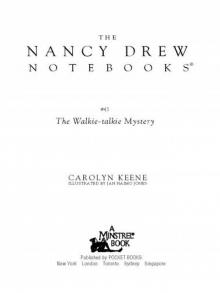 The Walkie-Talkie Mystery
The Walkie-Talkie Mystery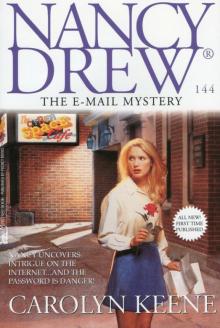 The E-Mail Mystery
The E-Mail Mystery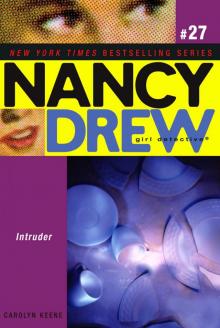 Intruder (Nancy Drew (All New) Girl Detective)
Intruder (Nancy Drew (All New) Girl Detective)![The Stolen Relic [Nancy Drew Girl Detective 007] Read online](http://i1.bookreadfree.com/i2/04/11/the_stolen_relic_nancy_drew_girl_detective_007_preview.jpg) The Stolen Relic [Nancy Drew Girl Detective 007]
The Stolen Relic [Nancy Drew Girl Detective 007]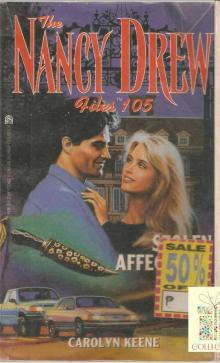 105 Stolen Affections
105 Stolen Affections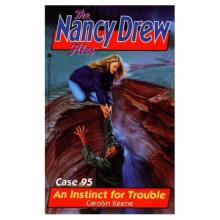 An Instict for Trouble
An Instict for Trouble 161 Lost In The Everglades
161 Lost In The Everglades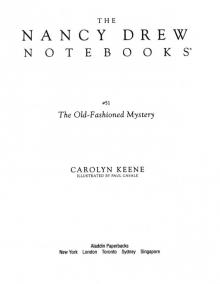 The Old-Fashioned Mystery
The Old-Fashioned Mystery Perfect Plot
Perfect Plot